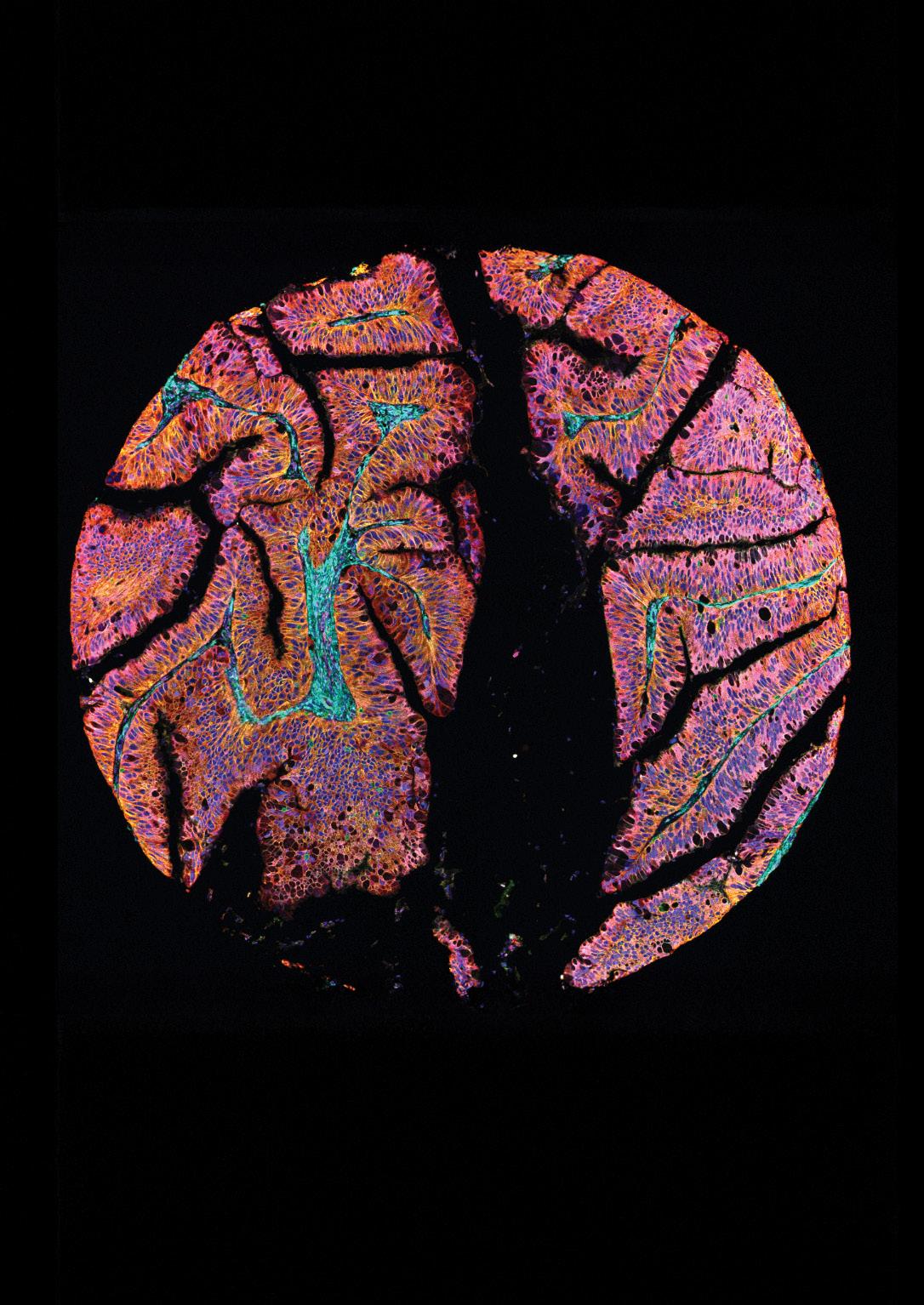

Annual Report 2024
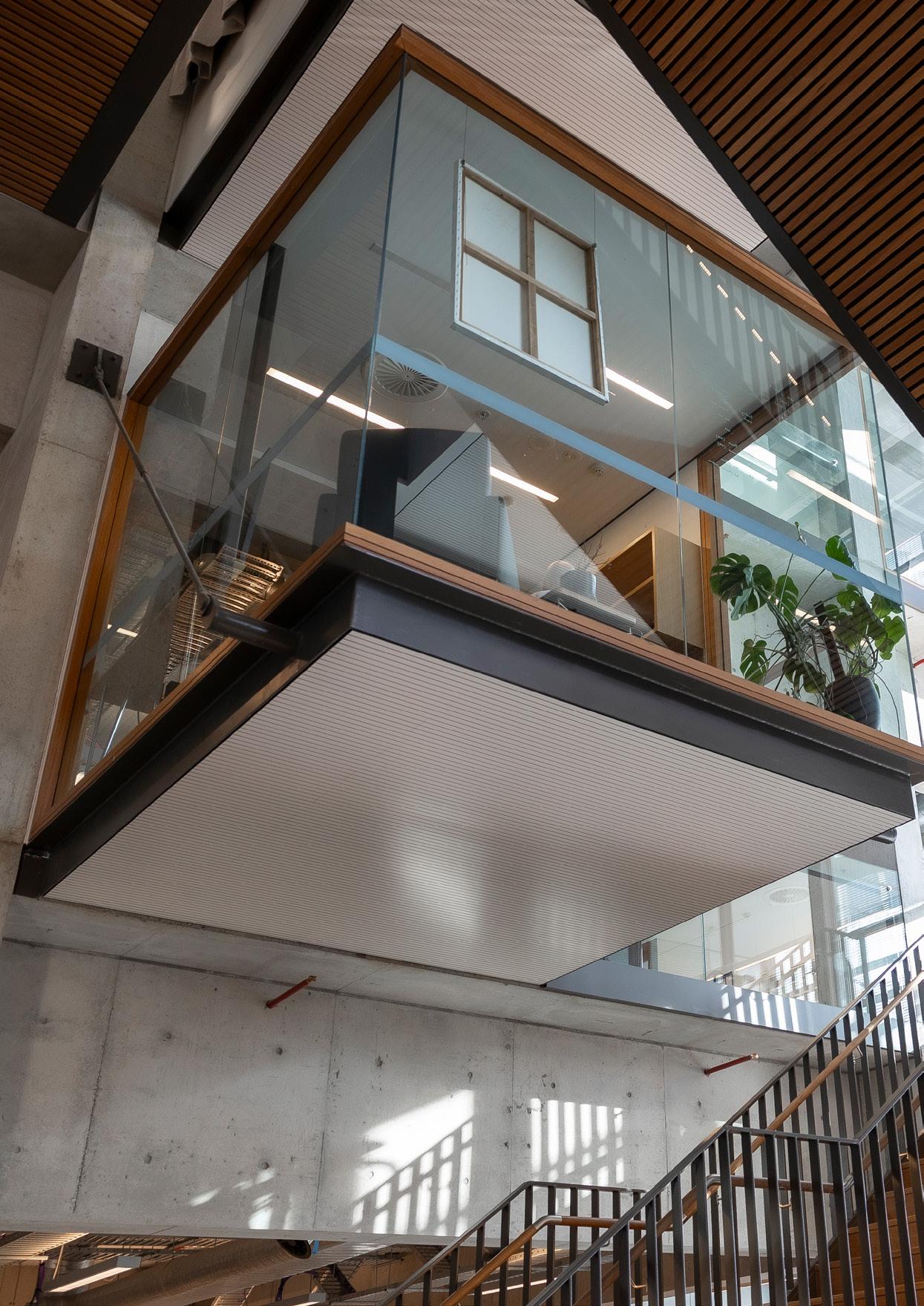
The Garvan Institute of Medical Research brings together worldleading researchers and clinicians, collaborating locally and globally, to advance our understanding of disease, particularly cancer, immune diseases and genetic disorders. We see a future where all diseases can be prevented, treated or cured. Building on our scientific strengths in genomics, cancer and immunology, enabled by cutting-edge technology and world-class facilities, we will drive more of our discoveries to clinical and societal impact.
Garvan

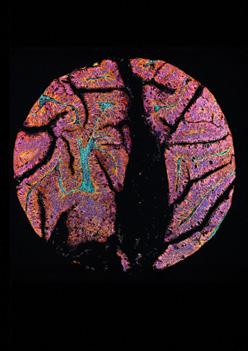
Message from the Chair and Executive Director of the Garvan Institute
In 2024, Garvan launched a bold new strategic plan.
This strategy, building on the foresight of generations of researchers at Garvan, sharpens our focus on cancer, genomics and immunology. Alongside the fundamentals of breakthrough science, we are embarking on a wideranging programme of investment in key people and capabilities to translate that research into greater clinical impact. This will lead to novel therapeutic approaches and new medicines that have their origin in Garvan science.
Garvan’s physical location and strategic partnerships as part of the St Vincent’s Sydney Health Innovation Precinct coupled with our affiliation with UNSW Sydney are important competitive advantages. Our research and translational ambitions dovetail neatly with those of the hospital and university, and we continue to build on these relationships.
The momentum of our science was reflected during the year by our outperformance in the awards of national medical research grants. Our researchers were recognised with the NSW Premier’s Prize for Excellence in Medical Biological Sciences and the UNSW Eureka Prize awarded to Professor Stuart Tangye, and the Early Career Researcher of the Year in the NSW Premier’s Prizes awarded to Dr Ira Deveson.
Garvan’s future success, more than any other factor, will be determined by our team of more than 700 scientists, clinicians, students and support staff – united by a passion for discovery and a deep commitment to improving health for all.
Their work is enabled by a generous community of donors, partners and volunteers. Your passion and support remain vital to our mission, especially as financial sustainability continues to challenge independent institutes. We are especially grateful to our Partners for the Future whose investment will ensure a bright future for this great institution.
We welcomed Professor Merlin Crossley AM to our Institute Board, leading cancer biologist Dr Ankur Sharma to Garvan’s Faculty, and Dr Rachel Galimidi as Head of the new Development and Biologics Platforms, strengthening our technological and translational capabilities. We extend our thanks to retiring Directors Ms Jillian Segal AO, Dr Helen Nugent AC and Professor Philip Cunningham OAM.
To all Garvan staff, students and community – our Garvan family – in what has been a watershed year, we recognise your continued focus and determination. At Garvan, we see a future where all diseases can be prevented, treated or cured. With your enduring support, it’s within reach.
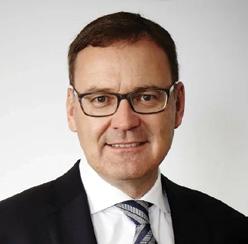

Scott Perkins Chair
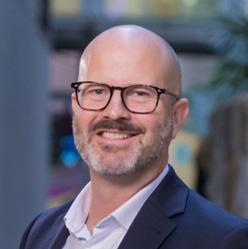
Professor Benjamin Kile Executive Director
Together, we are pushing the boundaries of medical research.
Message from the Chair and Director of the Garvan Research Foundation
The Garvan Research Foundation was founded by the Sisters of Charity in 1981 with a dedicated purpose to support the Institute and communicate the importance of its work. Fully integrated within the Institute, and performing the function of marketing, fundraising and public engagement, every dollar raised is transferred to the Institute.
2024 was a year that demonstrated the immense generosity and vision of the Garvan family with recordbreaking contributions of $57 million to accelerate Garvan’s critical medical research. This philanthropic investment is vital to Garvan’s ability to attract and retain brilliant scientific talent, to establish and develop globally competitive technological capabilities, and to make the discoveries today that will see a future where all diseases can be prevented, treated or cured.
The launch of Garvan’s new strategic plan provides an exciting opportunity to galvanise our remarkable community of supporters around our strengths in cancer, genomics and immunology, as well as the expansion of Garvan’s capabilities in biologics and data science, which will accelerate scientific discoveries into real world impacts. Support for Garvan Faculty in the form of philanthropic fellowships and programmatic funding remains a firm priority.
Through our public engagement program, we were thrilled to welcome more than 5,000 visitors to public tours, seminars and events. These occasions provided valuable opportunities to showcase the extraordinary work happening inside our laboratories and foster meaningful discussions about medical research and the future of health. We also launched the second season of Garvan’s podcast series, Medical Minds.
As we look ahead, we’re energised by the opportunity to expand our reach and impact, guided by our Foundation Board of Directors’ expertise and passion. To every member of the Garvan family – thank you for believing in the power of medical research. We are privileged to have your enduring support and advocacy, and excited for Garvan’s bright future.


Russell Scrimshaw AM Chair


Mara-Jean Tilley Director
To every member of the Garvan family – thank you for making our critical work possible.
Dr
2024 at a Glance
At Garvan, we see a future where all diseases can be prevented, treated or cured.
Garvan is one of Australia’s largest independent medical research institutes, built on a foundation of more than 60 years of pioneering research. We bring together world-leading scientists and clinicians, all driven by a passion – to make discoveries and translate them into impact for patients.
In 2024, our researchers made breakthroughs in pancreatic and breast cancers, cancer immunotherapy and autoimmune disease, and in how structural and epigenetic changes to DNA are linked to disease. We launched and progressed clinical trials and studies in cancer, cardiovascular and neurodegenerative disease and metabolic disorders.

Garvan
11 Garvan leadership
84
Honours, Masters & PhD students
Total staff
755
412 scientific papers published
22 PhD completions
$67M peer-reviewed research grants, fellowships and scholarships awarded
7300+ media mentions across print, radio, TV and online
403 Scientists
257 Professional staff
20 clinical trials launched or progressed
58 academic promotions
$57M in philanthropic funding
5100+ attended our public seminars and tours
Collaborations
Our global reach
Collaboration is essential for driving groundbreaking science that transforms our understanding of disease. At Garvan, we collaborate globally with experts from diverse disciplines, institutions and regions, to exchange resources and ideas. These collaborations strengthen our research and lead to more impactful discoveries.
The map below highlights our joint publications with international institutions.
Asia
Oceania
North America
Garvan is a cornerstone member of the St Vincent’s Sydney Health Innovation Precinct, Australia’s oldest and most established health partnership, and is proudly affiliated with UNSW Sydney.
South America
Accelerating Discovery, Empowering Translation
2025-2028 Strategic Plan
In November 2024, Garvan unveiled its bold vision for the future with the 2025-2028 Strategic Plan ‘Accelerating Discovery, Empowering Translation’.
The strategy is centred around our scientific strengths in cancer, genomics and immunology and focuses on five key priorities.
Our Five Key Priorities
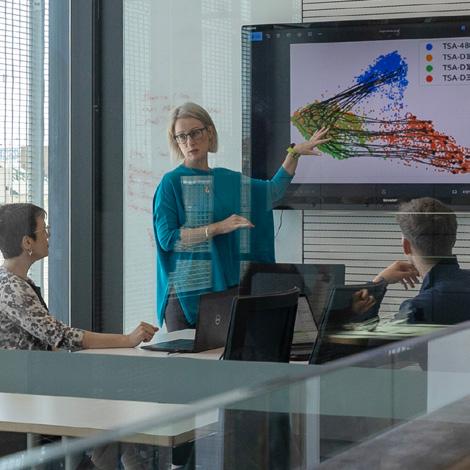
Our Strategic Plan is designed to empower our greatest asset – our people – by fostering a world-class culture of ambition, creativity, rigour and excellence.
Professor Benjamin Kile, Garvan Executive Director
Discovery
We conduct medical research that turns public support into public knowledge.
Without new knowledge, progress in combating disease is impossible. Garvan’s great strength is fundamental biomedical science, beginning with the human genome. As an institute, we embrace creativity and rigour to drive discovery and innovation. We seek to understand essentials, to question paradigms and to generate new understanding of human development and disease.
Our clear and ambitious research vision will advance our three core areas of scientific focus: cancer, genomics and immunology. We will cultivate depth and breadth in our research to ensure it has impact. We will strengthen and enhance the culture and environment that enables us to attract, develop and retain an exceptional research workforce. Our cutting-edge technologies and systems will empower our researchers to achieve transformative scientific breakthroughs.
KEY HIGHLIGHTS IN 2024
Dr Ankur Sharma was appointed to Garvan’s Faculty, bringing worldclass expertise in cancer biology and a well-established clinical translation program in liver cancer.
We established the Biologics Platform to accelerate the discovery and development of next-generation protein-based therapies, and the Development Platform to drive translation and commercialisation projects from concept to clinical application.
Dr Rachel Galimidi, an internationallyrenowned scientist and biotechnology leader with extensive expertise in antibody-based therapies, was announced as Head of the Biologics and Development Platforms.
Translation
We will translate knowledge into improved prevention, diagnosis and treatment of disease.
Collaborations are critical to advancing bold ideas. As part of our strategy, we will develop the framework, capability, policies and governance to drive more effective business development and commercialisation of Garvan research. This will include building constructive industry partnerships to drive translation and help us realise impact from our scientific discoveries. We will continue to evaluate and prioritise our intellectual property and patent portfolios to ensure we engage industry partners around our highestpotential discoveries.
KEY HIGHLIGHTS IN 2024
In May 2024, Garvan and Illumina, a global genomics and human health company, partnered on the TenK10K project, a $27m endeavour to help transform the treatment of complex diseases, including autoimmune diseases, heart diseases and cancer.
The Biologics Platform synthesised and produced the first antibodies for Garvan researchers, advancing new therapeutic approaches for cancers and autoimmune disease, as well as supporting basic research projects.
Development
We will educate, train and develop world-class researchers and professionals who will become the leaders of the future.
Garvan’s diverse group of staff, students and volunteers have a remarkably broad range of skills and expertise, all of which are required to enable our research and translation efforts. We take pride in the meaningful nature of our work and are committed to excellence in everything we do. We value and respect every individual and seek to unite researchers and professionals in pursuit of our mission. As part of our strategy, we will nurture a positive and inclusive culture providing every member of the Garvan community with the opportunity to flourish. We are committed to creating an enabling environment that values and supports training and development, ensuring our team members have the resources and encouragement they need to grow and succeed.
We achieved reductions in both our average total remuneration gender pay gap to 14.4% (from 18.6% in 2023) and in our median total remuneration pay gap to 5.8% (from 13.1% in 2023), which were significantly below our industry comparison group figures.
Reflecting our commitment to gender equality, two out of three Faculty appointments in 2024 were women. We also strengthened female representation in leadership , achieving 50% women in our leadership team.
We established new promotion pathways for early- and midcareer researchers, providing clearer processes to support their career progression.

Garvan
Engagement
We will engage, inspire and educate the community to deepen the understanding and impact of Garvan’s work and medical research more broadly.
Garvan is fortunate to have a deep, longstanding and authentic relationship with the community. We will build and expand on this vibrant community support base to strengthen our initiatives and deliver on our mission of health impact.
We will actively engage with the medical research sector and government to ensure collaboration, growth and impact in health research.
Institutional sustainability
We will strengthen and enhance the systems that support our mission and enable a high-performing, everevolving research culture that drives extraordinary science.
Medical research is a challenging and often unpredictable quest. As part of our strategy, we will establish a robust financial model that can navigate the inevitable peaks and troughs of medical research funding to provide our researchers with an environment that facilitates discovery and ensures they can pursue major scientific problems over the long term.
We will develop a long-term vision for Garvan’s premises, centred on an understanding of our current and future workforce, that will ensure that our research can grow and thrive for the decades to come.
KEY HIGHLIGHTS IN 2024
More than 5,100 visitors attended Garvan’s public seminars and tours.
Garvan continued its engagement with government, through meeting with policymakers and formal submissions to state and federal entities, advocating for the advancement of the medical research sector.
KEY HIGHLIGHTS IN 2024
We launched the IT transformation project to streamline ways of working, fostering greater collaboration and more efficient use of IT resources.
We implemented revised risk reporting protocols for the Institute to improve how we assess, manage and monitor risks to the Institute’s standing or financial sustainability.

Read more about our vision in our Strategic Plan –Accelerating Discovery, Empowering Translation.
garvan.org.au/strategic-plan
Our Research Focus
Our research strategy drives extraordinary science with a transformative impact on health.
Cancer
Cancer Ecosystems
Cancer Plasticity and Dormancy
Translational Oncology
Immunology
Precision Immunology
Immune Biotherapies
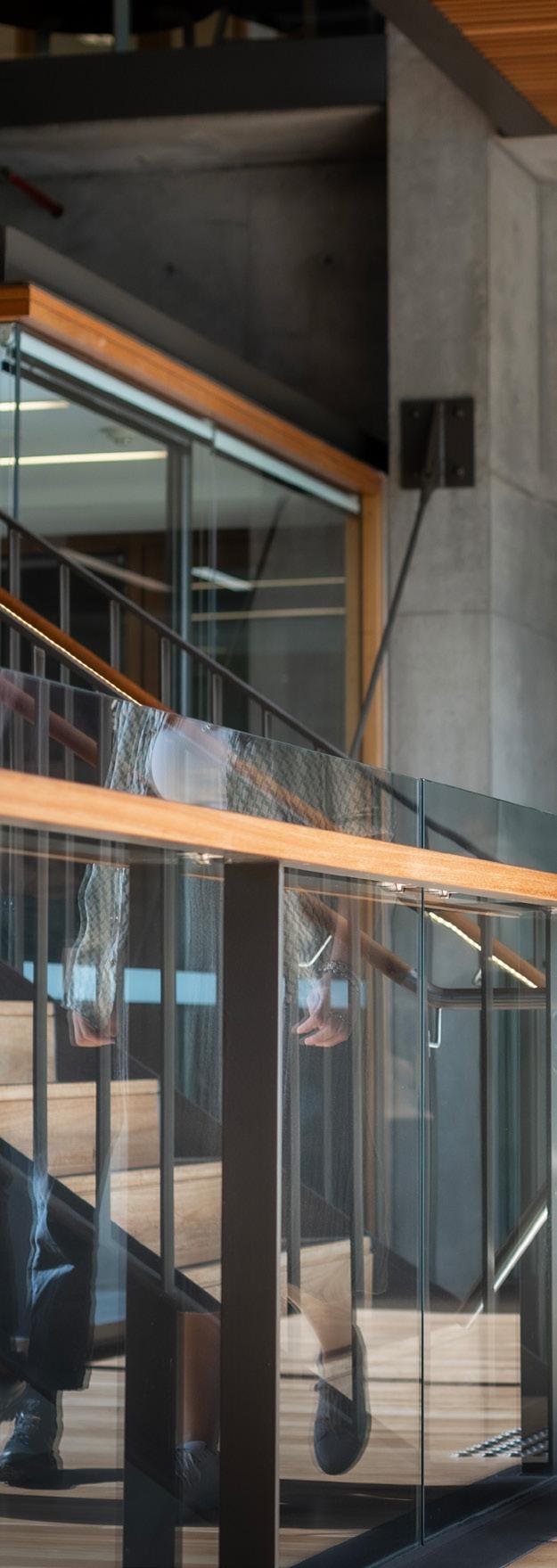
Genomics
Genomics and Inherited Disease
Translational Genomics
Centre for Population Genomics
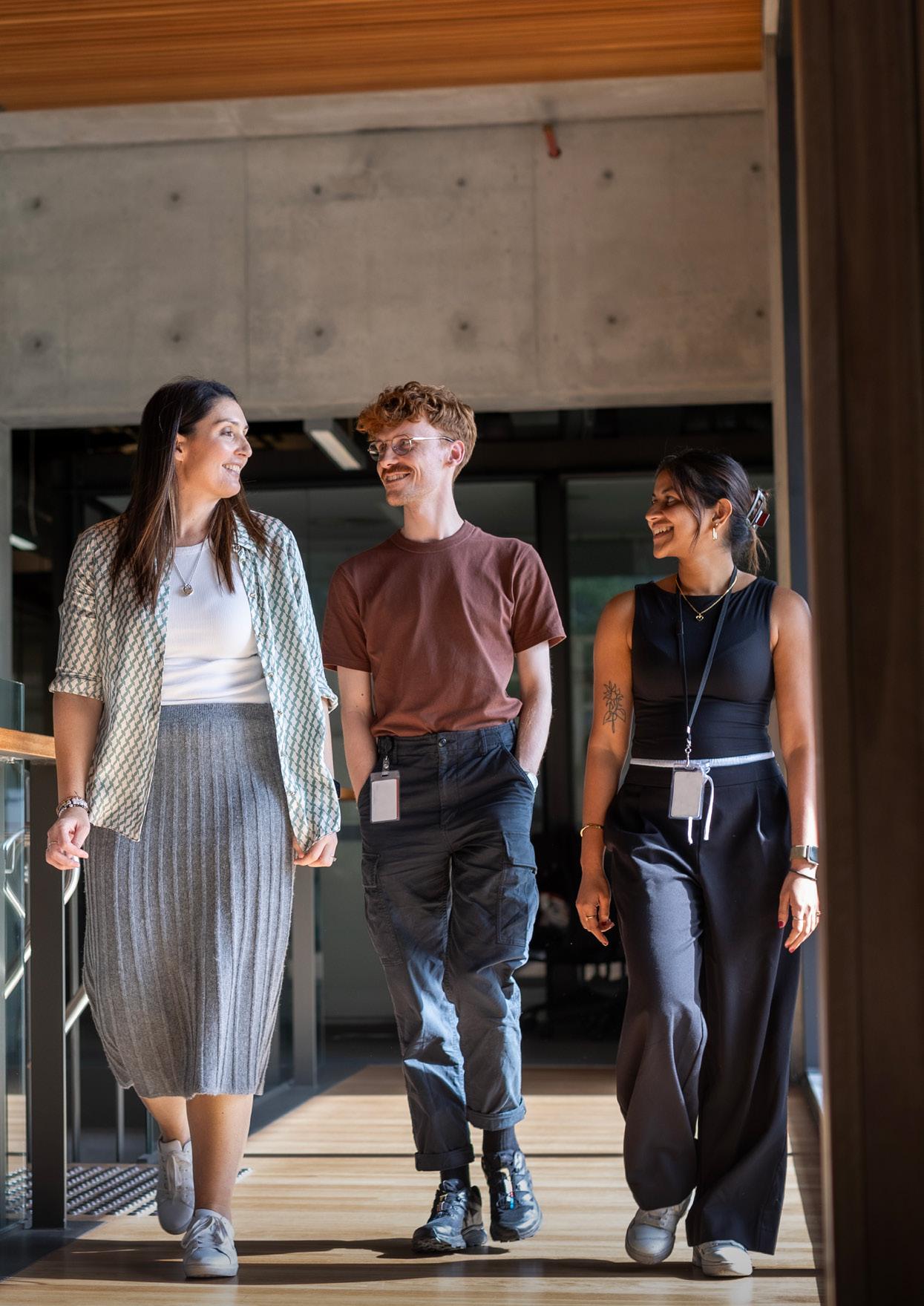

Our mission is to enable a future where all cancers can be effectively treated, controlled or prevented.
In 2024, Garvan’s cancer researchers investigated multiple cancer types, predominantly focusing on breast, pancreatic, multiple myeloma, liver, uveal melanoma and prostate cancer.
Our Research Programs Cancer
305 staff and students 23 labs and groups 119 research papers published
$13.5M+ secured in new peer-reviewed grants 57 active clinical trial collaborations
Cancer Ecosystems
Co-Directors
Professor Alexander Swarbrick and Professor Paul Timpson
Cancers develop within a complex ecosystem of cells that can determine how a tumour grows and responds to therapy. The Cancer Ecosystems Program is using advanced genomic, proteomic, imaging and epigenomic technologies to understand cellular relationships and build high resolution molecular ‘maps’. This is allowing researchers to discover and develop new diagnostic tests and cancer treatments targeting this ecosystem, including fibrosis, which is a major barrier to current therapies. The program’s primary focus areas are breast, prostate and pancreatic cancers.
IN 2024
The researchers investigated the composition of cells and tissue in and around cancers, making breakthrough discoveries in how changes in the supporting tissue of cancers influence therapeutic resistance and the activity of immune cells. These findings have given rise to multiple potential biomarkers, treatment strategies and new drug targets, which the team are in the process of testing.

The Kinghorn Cancer Centre
The Kinghorn Cancer Centre (TKCC) is a landmark partnership between Garvan and St Vincent’s Hospital Sydney and represents a cornerstone of the St Vincent’s Health Innovation Precinct. By uniting researchers, clinicians and patients under one roof, TKCC accelerates the translation of cutting-edge discoveries into personalised cancer treatments. TKCC houses one of the busiest Phase 1 clinical trials units in the country and is the head of the New South Wales Phase 1 clinical trials consortium, known as NECTA.
With a strong focus on genomics, clinical trials and compassionate care, TKCC is reshaping cancer outcomes across New South Wales and beyond. The Centre is poised to expand its impact and capabilities and strengthen its position as a world-class research hub for innovation, collaboration and next-generation cancer care.
Garvan acknowledges the unparalleled support of The Kinghorn Foundation in the establishment of TKCC and we extend our gratitude to the family for their significant investment in breakthrough medical research.
Cancer Plasticity and Dormancy
Co-Directors
Associate Professor Christine Chaffer and Professor Peter Croucher
The spread of cancer to distant sites throughout the body is the leading cause of cancer-related deaths. The focus of the Cancer Plasticity and Dormancy Program is to study cancer cells that have disseminated around the body, which are the seeds of relapse and the origin of metastatic disease. By investigating the intricate relationship between cancer cells, the bone microenvironment and the immune system, the researchers aim to solve the clinical challenge posed by cancer metastasis.
Translational Oncology
Co-Directors
Professor Anthony Joshua and Professor Marina Pajic
The focus of the Translational Oncology Program is to transform the future of cancer care using a precision medicine approach. Enabled by a vast clinical collaboration network, the researchers are using sophisticated analytical technologies to drive a deeper understanding of how cancers evolve and how they evade destruction. The team is exploiting this understanding to develop new treatments for cancer, with an initial focus on diseases with the poorest prognoses, including pancreatic, breast, prostate cancers and ocular melanoma.
IN 2024 IN 2024
We used the most sophisticated technology to isolate and study disseminated cancer cells in the bone of breast and multiple myeloma cancer patients. We discovered potential therapeutic vulnerabilities that are currently being tested in the laboratory. Through our close clinical and consumer collaborations, our goal now is to translate these preclinical discoveries into curative treatments for cancer patients.
We generated a new understanding of the mechanisms behind clinical treatment failure, identified new targets and built effective systems for translation of Garvanled advances from ‘bench to bedside’. Our integrated team of leading cancer researchers and clinical oncologists advanced pre-clinical findings into clinical trials to improve outcomes for patients and their families.
Research highlights
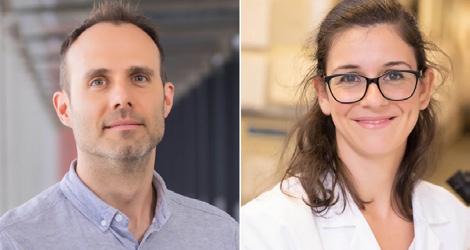

Softer tumours fuel more aggressive spread of triplenegative breast cancer
Why do some breast cancers spread more aggressively than others? Research led by Professor Thomas Cox has shown that the physical softness of triple-negative breast tumours can prime cancer cells to survive and spread more easily. Using biomaterials that mimic tumour stiffness, his team found that cells from softer environments were up to 11.8 times more likely to metastasise in mouse models than those from stiffer tumours.
Triple-negative breast cancer is aggressive and difficult to treat due to the absence of hormone and HER2 receptors. The study, published in Advanced Science, revealed that cells in soft tumours undergo a metabolic shift, stockpiling lipids for energy and activating both glucose and lipid metabolic pathways. This metabolic flexibility allows cells to better survive the stress of detaching from the primary tumour, travelling through the bloodstream and forming new tumours in distant organs.
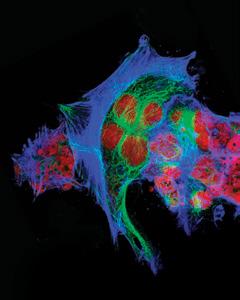
Nidogen-2 identified as treatment target in pancreatic cancer
A molecule called nidogen-2 has been identified as a potential driver of pancreatic cancer progression and spread, offering a promising new therapeutic target. In a study led by Dr Brooke Pereira, Professor Thomas Cox and Professor Paul Timpson, the molecule was found to be elevated in highly metastatic tumours and a contributor to the dense tumour matrix that hinders treatment. Using CRISPR gene editing, the team reduced nidogen-2 levels in mouse models, which led to smaller tumours, improved blood vessel function and enhanced drug delivery.
Pancreatic cancer has a low five-year survival rate and is often diagnosed at an advanced stage. The tumour’s dense extracellular matrix limits the effectiveness of chemotherapy. The research team used a technique called tissue decellularisation to isolate tumour scaffolding and identify molecules influencing disease progression.
In models with reduced nidogen-2, chemotherapy was more effective and metastatic spread to the liver was significantly reduced. The findings suggest that targeting nidogen-2 could enhance current treatments and potentially improve survival outcomes.
Inhibiting lipid metabolism in these ‘primed’ cells meant they were less able to metastasise. The findings suggest that targeting metabolic adaptations could improve treatment for the 2,500 Australians diagnosed each year with this cancer type.
Future work will explore combining metabolismtargeting drugs with existing therapies. The study highlighted how tumour mechanics can influence disease progression and may lead to more tailored treatment strategies for metastatic triple-negative breast cancer.

Read more garvan.org.au/news/ breast-cancer
Development of clinical tools such as antibodies against nidogen-2 is underway. These could be combined with chemotherapy or immunotherapy to address pancreatic cancer’s treatment resistance.
This work, published in Science Advances, was recognised with the Matrix Biology Society of Australia and New Zealand (MBSANZ) MCR Paper of the Year 2024.


ABOVE: Microscopic view inside mouse model of pancreatic cancer tumour
Read more garvan.org.au/news/ new-target
ABOVE: Professor Thomas Cox and Dr Elysse Filipe
ABOVE: Professor Paul Timpson, Dr Brooke Pereira and Professor Thomas Cox
ABOVE: Triple-negative breast cancer cell

Epigenetic therapy shows promise for endocrine-resistant breast cancer
Researchers demonstrated how a specific epigenetic change drives resistance to hormone therapy in breast cancer – and how it might be reversed using an existing drug.
Endocrine resistance is a major reason why oestrogen receptor-positive (ER+) breast cancers stop responding to treatment. In 2020, Garvan researchers linked this resistance to DNA methylation – a process that alters the 3D structure of DNA, silencing oestrogen receptor genes and allowing tumours to grow without the hormone.
Now, the same team has shown that this methylation can be reversed using the epigenetic therapy drug decitabine. In mouse models, decitabine removed methyl groups from key regulatory regions, restored DNA structure, reactivated oestrogen receptor and tumour suppressor genes and reduced tumour growth – increasing survival time by 90%.
Led by Associate Professor Clare Stirzaker, Dr Joanna Achinger-Kawecka and Professor Susan Clark, and published in Nature Structural & Molecular Biology, the study offers a potential new treatment for the 4,000 Australians diagnosed each year with endocrine-resistant breast cancer.
Decitabine is already approved for certain blood cancers. The researchers plan to test it in combination with hormone therapy in a future Phase 1 clinical trial – a step they hope could change the outlook for patients with this hard-totreat cancer.

AI uncovers cancer-driving mutations in non-coding DNA
What if the key to treating cancer lies in the 98% of our DNA we once dismissed as ‘junk’ because it doesn’t contain instructions for making protein? A study led by Dr Amanda Khoury and Professor Susan Clark has used artificial intelligence to uncover mutations in ‘non-coding’ DNA that may drive at least 12 cancers, including prostate, breast and colorectal –revealing a potential universal approach to diagnosis and treatment.
The study, published in Nucleic Acids Research, focused on mutations affecting binding sites for a protein called CTCF, which helps fold DNA into specific shapes. Researchers found that certain CTCF binding sites act as ‘persistent anchors’ in the genome across different cell types, and disruption of these anchors could contribute to cancer development.
Using a new machine learning tool called CTCF-INSITE, the team analysed over 3,000 tumour samples and found that every cancer sample had at least one mutation in a persistent CTCF binding site. This suggests these mutations give cancer cells a survival advantage.
Because these CTCF anchors are mutated across multiple different cancer types, the findings could open possibilities for developing a more universal approach to cancer diagnosis and treatment. Researchers are now planning further experiments using CRISPR gene editing to investigate how these anchor mutations disrupt the 3D genome.


Read more garvan.org.au/news/ junk-dna
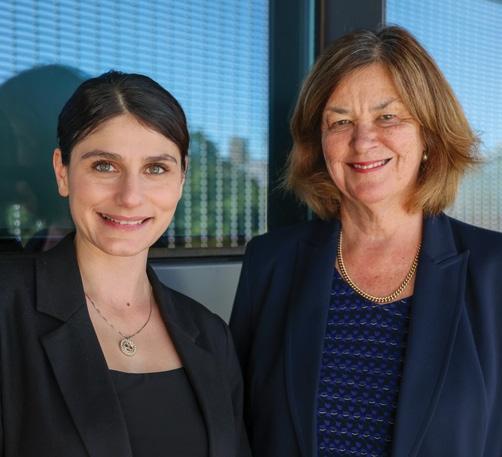
BELOW: Dr Amanda Khoury and Professor Susan Clark
RIGHT: Associate Professor Clare Stirzaker
ABOVE: Dr Joanna Achinger-Kawecka
Osteoporosis drug trial to rebuild myeloma-damaged bone
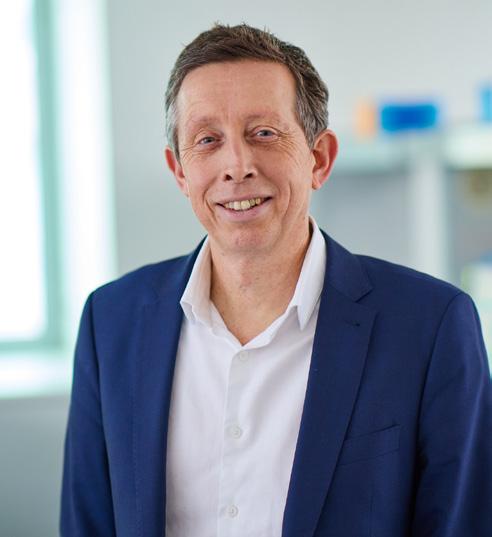

Read more garvan.org.au/news/myelomabone-disease
Enabled by Garvan’s extensive clinical collaboration network across St Vincent’s Hospital Sydney and others, our researchers contributed to more than 50 clinical trials in 2024 to advance their research from bench to beside.
These trials spanned new treatment approaches for several cancers, including cancers of the pancreas, breast, liver, lung, ovary and prostate.
A clinical trial is investigating whether romosozumab – a drug approved for osteoporosis – can help repair bone damage caused by multiple myeloma, not just prevent it. Led by Dr Georgia McCaughan, Professor Peter Croucher and Professor Tri Phan, the study is exploring the drug’s potential to restore bone health in the around 80% of patients whose bones have been weakened by this incurable blood cancer.
Romosozumab works by inhibiting sclerostin, a protein that blocks bone formation and is elevated in myeloma. Previous preclinical studies in mouse models showed that blocking sclerostin increased bone density and regeneration. The trial’s aim is to determine whether these effects can be replicated in humans.
The study is enrolling patients with bone damage despite receiving bone-preserving treatments such as bisphosphonates or denosumab. Participants will receive monthly doses of romosozumab along with calcium and vitamin D supplements, with outcomes monitored over a two-year period.
Researchers are also using single-cell sequencing to observe how the bone marrow environment responds to treatment. These insights could help tailor future bone-targeted therapies for myeloma patients.
If successful, romosozumab could not only prevent further bone loss but also repair existing damage, offering a new therapeutic avenue to improve quality of life and reduce complications in affected patients.
ABOVE: Professor Peter Croucher
Garvan

ABOVE: Professor Alexander Swarbrick
Breast Cancer Cellular Atlas
A global initiative led by Professor Alexander Swarbrick at Garvan, the Breast Cancer Atlas Consortium is creating the world’s most detailed single-cell and multi-omic map of breast cancer and its surrounding ecosystem. In 2024, researchers completed the key milestone of single-cell RNA sequencing more than one million cells from more than 200 breast cancer patients who donated tissue to our research. The project also received a major four-year international grant, significantly expanding its scope and accelerating efforts to understand the disease at a cellular level – with the ultimate goal of improving the diagnosis, treatment and outcomes of breast cancer.
Paspaley and Garvan partner to advance cancer research
Paspaley is more than a creator of exquisite jewellery – since 2016, it has been a critical partner in the pursuit of Garvan’s groundbreaking cancer research, generously contributing 20% of the proceeds from each sale of its elegant Kimberley bracelet.
In 2024, this partnership reached a remarkable milestone, with donations nearing $3 million. Paspaley’s continued generosity has played a crucial role in advancing cancer research and has helped identify treatment recommendations for more than 4,000 cancer patients.
By supporting Garvan’s cutting-edge work, Paspaley is helping Garvan researchers unravel the complex cellular mechanisms driving different cancers and fast-track the development of more effective, targeted treatments that are tailored to the DNA of individual tumours or patients.
The exclusive Kimberley bracelet collection combines hand-selected Australian South Sea pearls with regional, aromatic sandalwood for a wearable, timeless style.

Credit: Sophie van der Leij, PhD student in the


Read more garvan.org.au/breastcancer-cell-atlas
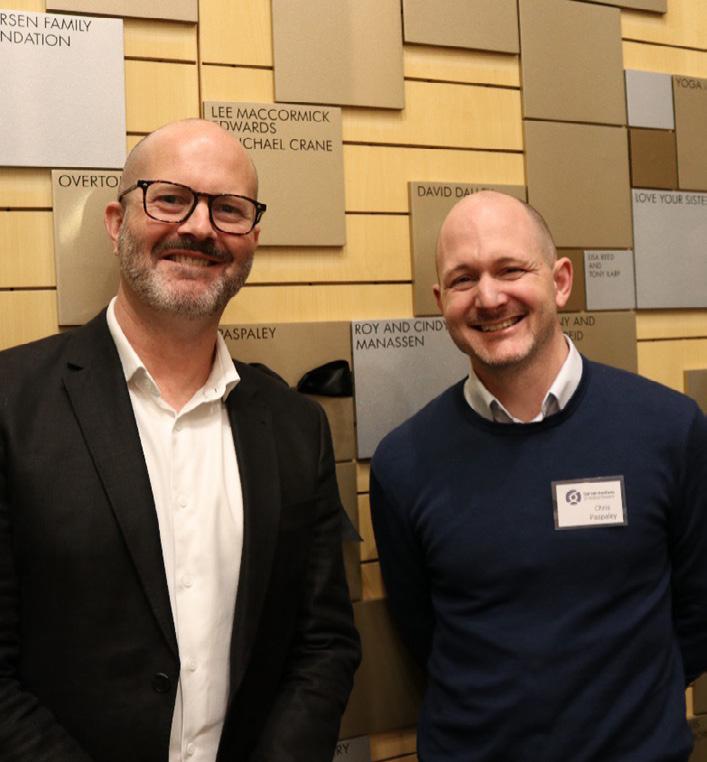
BELOW: Spatial transcriptomic analysis of breast cancer tissue reveals tumour heterogeneity.
Swarbrick Lab
BELOW: Professor Benjamin Kile with the Executive Director of Paspaley Jewellery, Chris Paspaley
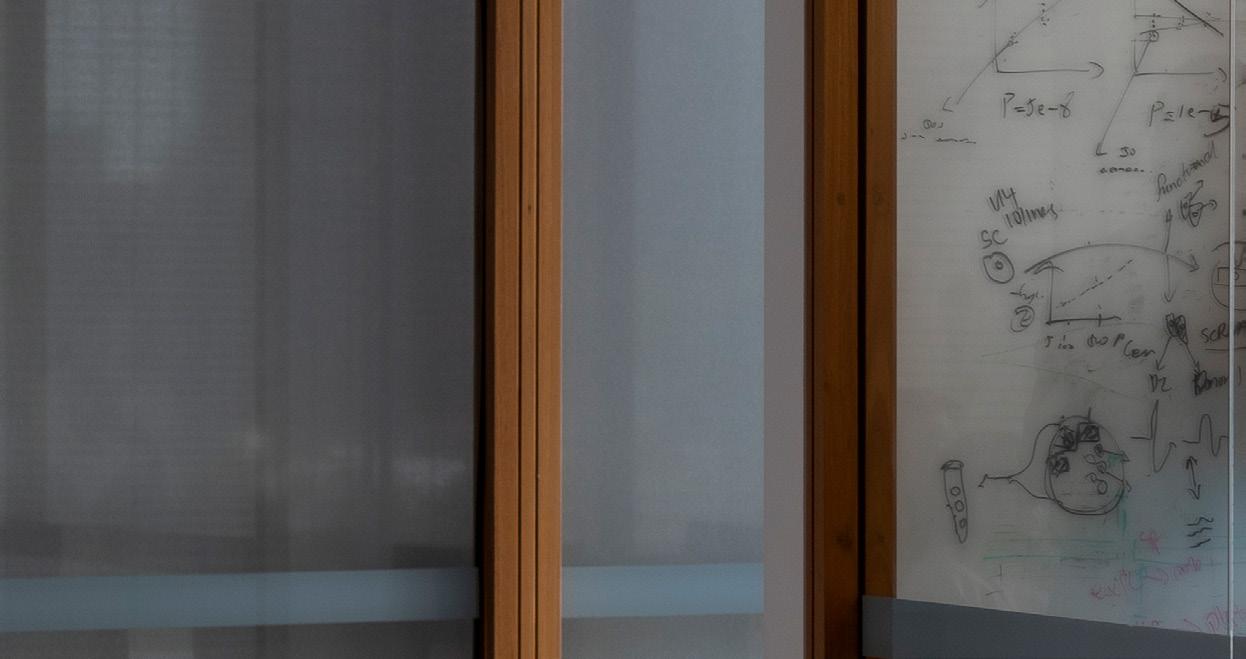
Genomics
Our mission is to accelerate the diagnosis and treatment of inherited disease and develop innovative new therapies for some of the most prevalent conditions facing society today. In 2024, we developed research pipelines that connect genomic discovery to clinical application, advancing diagnoses and treatments for cancer and immune disease, and laying the foundation for more equity in genomics research.
156 staff and students
Our Research Programs
Genomics and Inherited Disease
Co-Directors
Associate Professor Jodie Ingles and Associate Professor Owen Siggs
17 labs and groups
142 research papers published
$27M+ secured in new peer-reviewed grants
The Genomics and Inherited Disease Program is paving the way for a precision medicine approach to patient care, by identifying the genetic causes of disease. Using state-of-the-art genomic sequencing and analysis approaches, we are identifying genetic drivers in rare diseases of the immune system, heart, eyes, kidney and brain.
IN 2024
We developed a research pipeline that leverages key strengths across Garvan to maximise the likelihood of making new genetic diagnoses and improve access to research opportunities, with the aim to lead to better patient care.
This is evident through the Genomics of Rare Disease Registry, where we have successfully recruited 300 participants across Australia, hoping to expand our reach to connect participants to new research, potential therapeutics and clinical trials. Enabled by our key scientific strengths in data, genomics, cellular, translational and clinical science, we are now working to translate research from fundamental discovery to clinical impact.
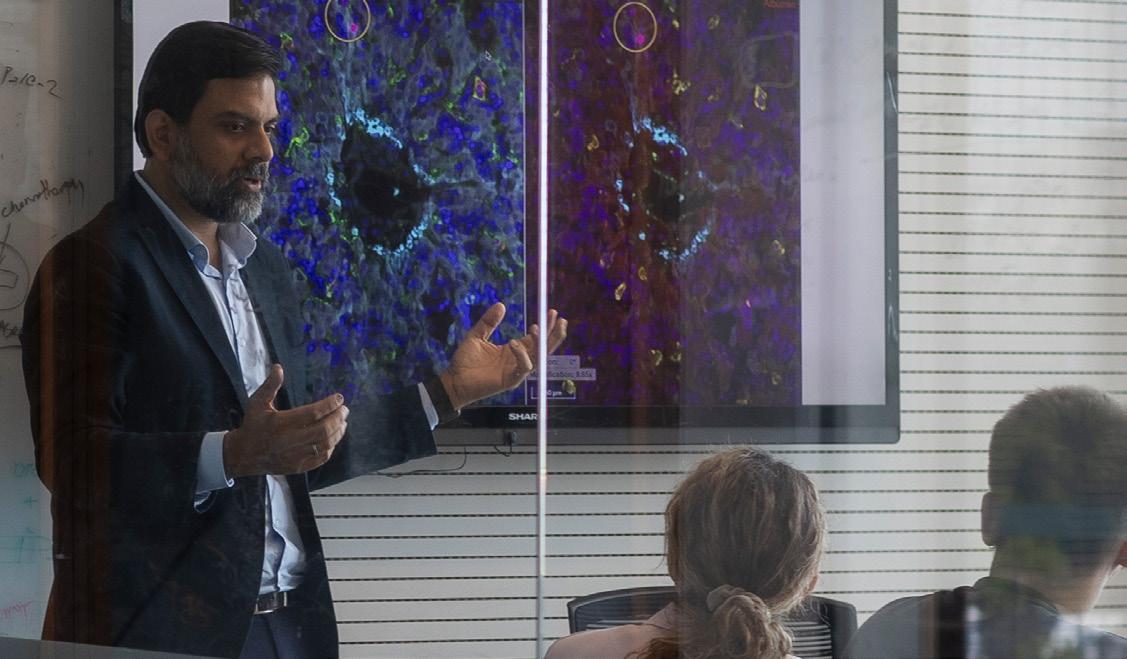
Translational Genomics
Director Professor Joseph Powell
While our DNA acts in individual cells, it does not act the same way in every cell. The Translational Genomics Program is using cellular genomics to reveal new cell subtypes and genetic elements that underpin disease. By profiling single cells from thousands of people, we are uncovering new knowledge on the genetic causes of complex diseases, such as brain, liver and colorectal cancer, autoimmune disease and neurodegenerative disorders.
IN 2024
We established a coherent translational pipeline connecting single-cell discovery, multi-omics biomarker development and drug testing –positioning Garvan at the forefront of precision immunology and oncology.
We deep-sequenced thousands of patients and paired the data with stem cell models to create a drug testing platform that is already steering target optimisation for rheumatoid arthritis, Crohn’s disease and multiple cancers. Capitalising on these datasets and a biobank at St Vincent’s Hospital, we revealed cellular and microbial signatures in inflammatory bowel disease that have pinpointed early biomarkers for colorectal cancer and checkpoint-inhibitor colitis, to stratify patients and personalise therapy. We also identified ‘oncofoetal’ cell populations in lung, colon and brain tumours –a discovery that is set to transform the design of immunotherapies.
Centre for Population Genomics
Director Professor Daniel MacArthur
The Centre for Population Genomics (CPG), established by the Garvan Institute and Murdoch Children’s Research Institute, is a national initiative focused on delivering rapid and equitable health benefits through genomic medicine in Australia.
IN 2024
In collaboration with the Genomics and Inherited Disease Program and more than 30 other partners, we assembled Australia’s largest genomic dataset from families affected by severe genetic disease, resulting in over 450 new diagnoses, many of which have led to meaningful changes in health outcomes. Through a partnership with Microsoft Research, we developed AI approaches to enhance rare disease detection and accelerate their integration into clinical practice.
The CPG leads the OurDNA program, which is partnering with Australian communities to establish the most diverse genomic cohort in the southern hemisphere, with the goal of understanding the impact of genetic variation in Australian communities and aiding genetic diagnosis. To date, more than 1,250 participants have been recruited from Filipino and Vietnamese communities.
Research highlights
International cellmapping partnership targets complex diseases
Garvan partnered with genomics company Illumina to launch the TenK10K project, a $27 million initiative to map 50 million human cells from 10,000 people using single-cell sequencing. The goal is to identify diseaselinked immune cell ‘fingerprints’ that could improve diagnosis and treatment for conditions including autoimmune diseases, cancer and heart disease.
The project, led by Professor Joseph Powell, builds on the OneK1K trial, which analysed over one million cells from 1,000 individuals. That study identified genetic markers associated with autoimmune disease and informed a clinical trial for Crohn’s disease. Early results suggested that genomic profiles could help match patients with the most effective therapies.
TenK10K aims to scale this approach, enabling more accurate prediction of disease risk and treatment response. Data from the study will support development of commercial diagnostic tests, identification of early therapeutic targets and tracking of disease progression, including in long COVID and post-heart attack recovery.
By generating one of the world’s largest single-cell genomics datasets, the project is expected to accelerate personalised medicine, guide RNA-based therapies, and improve care for people with hard-to-treat conditions such as multiple sclerosis, lupus, type 1 diabetes and inflammatory bowel disease.
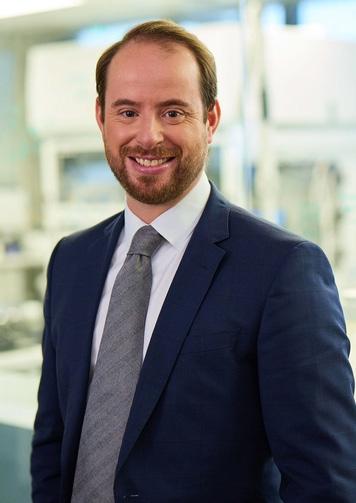

Read more garvan.org.au/news/geneticfingerprint
Clinical trial aims to slow progression of Parkinson’s disease
A clinical trial, part of the Australian Parkinson’s Mission (APM), is investigating whether two existing medications could slow the progression of Parkinson’s disease and whether genetics can guide personalised treatment strategies.
Led by researchers at the Garvan Institute of Medical Research, Macquarie University and the University of Sydney, the APM002 trial is recruiting 240 participants across eight sites in Australia. It will test whether a respiratory medication and a widely used antibiotic –

alone or in combination – can protect nerve cells from the damage caused by Parkinson’s disease.
Parkinson’s affects over 150,000 Australians and currently has no treatment to halt its progression. This trial uniquely combines clinical trials with genomics research and biomarker analysis to identify whether specific genetic profiles can predict a patient’s response to treatment – bringing a precision medicine approach to a condition where causes remain largely unknown.
Research participants across eight sites around Australia will receive one of three possible treatments, or placebo, while they continue their usual Parkinson’s medication.
If successful, APM002 could lay the groundwork for personalised Parkinson’s therapies that could be transformative for patient outcomes.

Read more garvan.org.au/news/ clinical-trial-parkinsons
ABOVE RIGHT: Professor Joseph Powell
Rare disease discovery: RNU4-2 and ReNU syndrome
In March 2024, Professor Nicky Whiffin from Oxford’s Centre for Human Genetics contacted CPG about a potential novel rare disease gene, RNU4-2. Within 30 minutes, CPG’s rare disease team had identified six previously undiagnosed individuals in four Australian cohorts with likely causal mutations in the same gene. This rapid response led to a landmark Nature publication in July 2024, marking the first description of ReNU syndrome.
Since then, CPG’s automated reanalysis platform, Talos, has identified four additional ReNU diagnoses in clinical cohorts, all now returned to families. ReNU syndrome is estimated to cause ~1 in 200 neurodevelopmental disorders globally, representing around 100,000 individuals living with this condition, and is already the focus of multiple therapeutic development programs.
ReNU syndrome is a powerful example of how CPG’s rare disease research platform enables rapid, crosscohort discovery, accelerates diagnoses and drives translational research at global scale.
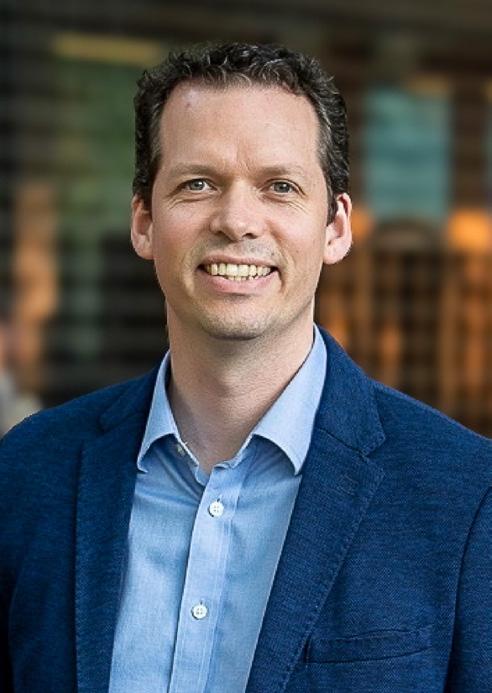
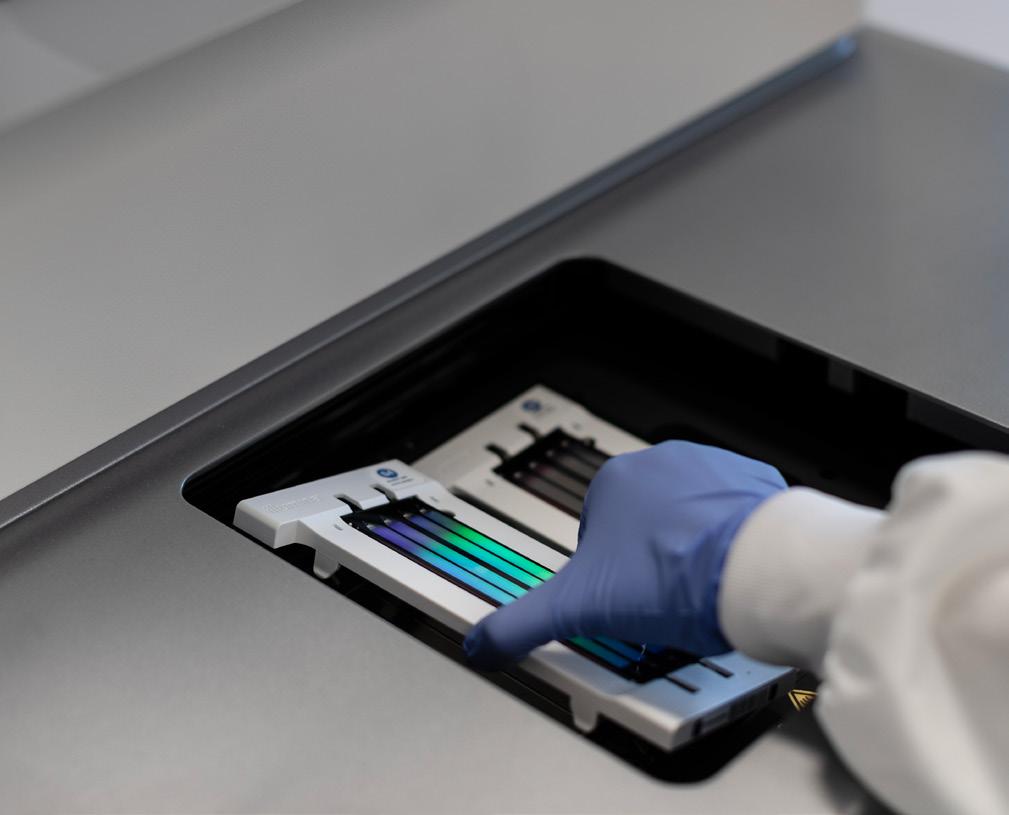
RIGHT: Professor Daniel McArthur
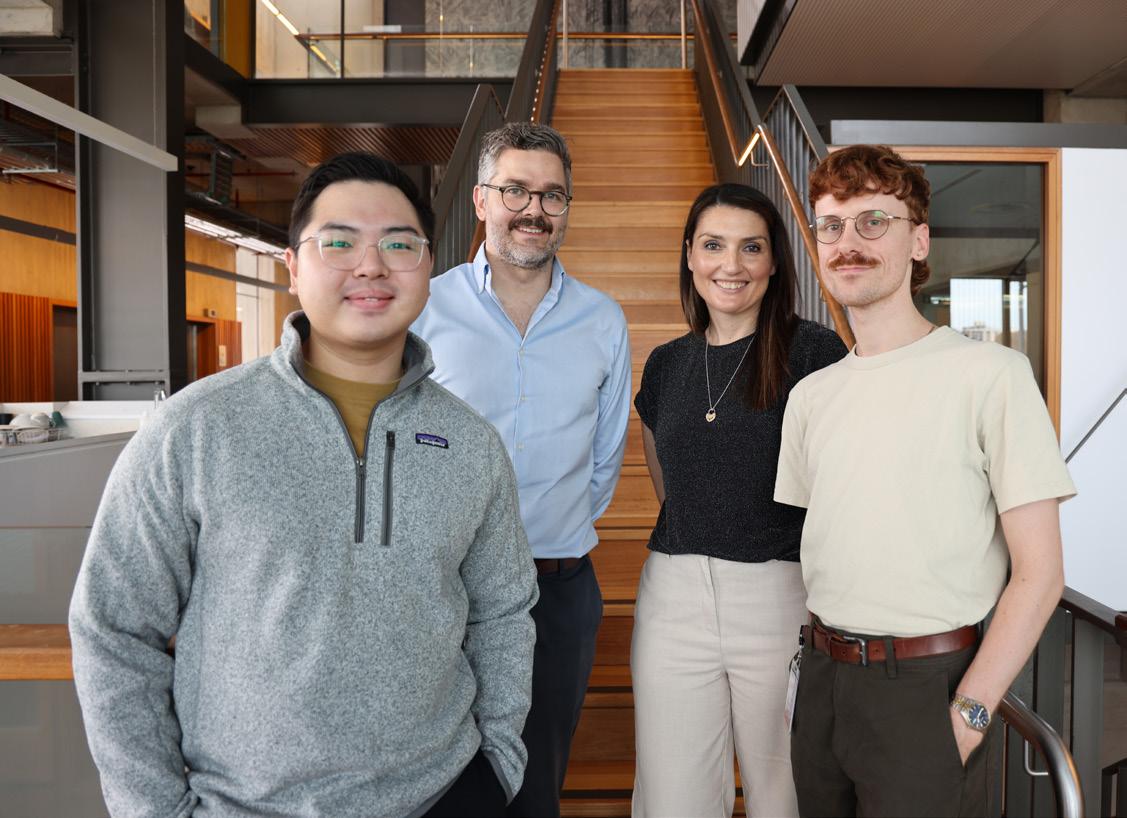
A national registry aiming to understand rare inherited diseases and connect families with new research opportunities
The Genomics of Rare Disease Registry, led by Associate Professors Jodie Ingles and Owen Siggs at Garvan, is aiming to uncover the genetic causes of rare and inherited diseases – conditions that affect nearly two million Australians but often remain overlooked and under-researched. By collecting clinical and genetic data, the registry connects participants to future research studies, clinical trials and one another.
Offering hope through discovery
For Rosie, who inherited polycystic kidney disease (PKD) from her father, attending a Garvan seminar offered something she hadn’t had before: hope. “They said that in the future they might be able to slow down my disease or turn off the gene,” she says. “I have hope that my son has a life that is not limited by PKD, even if he has inherited my kidneys.”
The registry’s findings could offer families like Rosie’s a chance to accelerate diagnosis and discover targeted therapies that could change lives – now and for future generations.

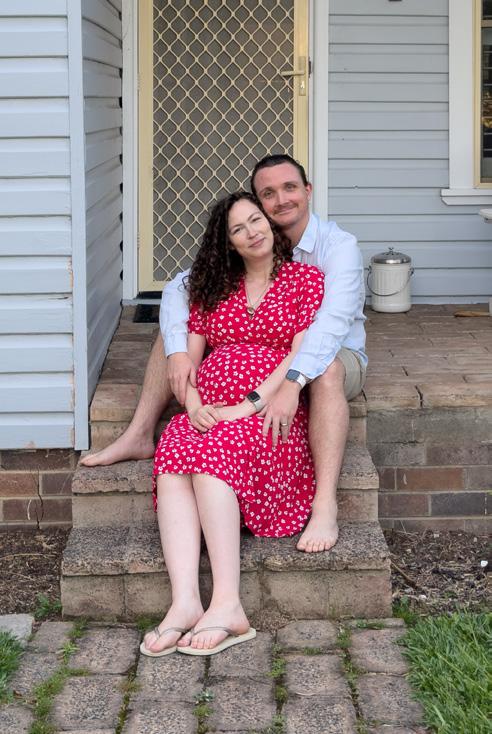
ABOVE: Program Manager Jonathan Nguyen, Associate Professors Owen Siggs and Jodie Ingles, and PhD Candidate Lucas Mitchell
RIGHT: Rosie and her husband the day before their son was born

Study reveals cause of common immunotherapy side effect
Checkpoint inhibitors have transformed cancer care by boosting T cell responses against tumours, but around 20% of patients experience increased susceptibility to infections. A study co-led by Professor Stuart Tangye at Garvan provided new insight into this side effect, highlighting a trade-off between anti-tumour immunity and broader immune defence.
The research, published in Immunity, examined rare genetic deficiencies in the PD-1 and PD-L1 immune pathways, as well as animal models with disrupted PD-1 function. The findings showed that while PD-1 inhibition boosts T cell activity, it simultaneously impairs B cells – the antibody-producing cells crucial for protecting against infection.
Specifically, the study found reduced diversity and quality of antibodies in individuals with PD-1/PD-L1 deficiencies, suggesting that checkpoint inhibition can weaken memory B cell responses. This reduced immune memory could explain the increased infection rates observed in patients undergoing checkpoint inhibitor therapy.
The research points to possible interventions, such as monitoring B cell function or using immunoglobulin replacement therapy in high-risk individuals. These findings help refine immunotherapy protocols to preserve protective immunity while maintaining cancer-fighting effectiveness.
BELOW: Illustration of an antibody.
credit: Dr Ofir Shein-Lumbroso, Biomedical Animator through the Garvan-Weizmann Partnership.

Advancing Genomic Medicine with a Snow Fellowship
In 2021, thanks to the incredible support of the Snow Medical Research Foundation, Associate Professor Owen Siggs brought his world-leading expertise to the Garvan Institute of Medical Research. He now leads the Genomic Medicine Lab and co-directs the Genomics and Inherited Disease Program.
The prestigious $8 million, eight-year Snow Fellowship is enabling Associate Professor Siggs and his team to pursue a bold, longterm research vision, using genomics to better diagnose, predict and treat diseases of inflammation, ageing and blindness. The researchers are collaborating with the Centre for Population Genomics to diagnose severe genetic diseases, and with the Translational Genomics Program to understand the genetic links between inflammation and cardiovascular disease.
The Snow Fellowship gives Associate Professor Siggs the independence, flexibility and time to build a world-class research team and conduct innovative, pioneering science. We are deeply grateful to the Snow Medical Research Foundation and the Snow family for their generosity and investment in groundbreaking medical research.

ABOVE: Professor Stuart Tangye
Photo
BELOW: Associate Professor Owen Siggs
Immunology
Our mission is to improve the management of immune conditions and to harness the immune system to develop treatments personalised to individual patients. In 2024, our focus was on forming strong cross-disciplinary relationships, collaborating with clinical immunologists, and ensuring translational outcomes via a bench-tobedside approach in designing our research questions.

124 staff and students
Our Research Programs Immune Biotherapies
Director
Professor Robert Brink
34 research papers published 13 labs and groups
$9.6M+ secured in new peer-reviewed grants
The Immune Biotherapies Program is leveraging the vast therapeutic potential of the immune system to develop a curative method of reversing pathogenic mutations in bone marrow stem cells in patients. Building on a decade of experience using CRISPR gene editing, we are also leading the design and testing of new targeting strategies for mRNA vaccines, cancer vaccines and immunotherapies.
IN 2024
We advanced the development of viruslike particle technology designed to cure monogenic diseases of the immune system, and of lipid nanoparticles supporting a new generation of mRNA vaccines to fight infectious disease and cancer.
We leveraged our expertise in structural biology to design antibody therapeutics and developed animal models that will progress our research to improve treatments for a rare inflammatory bowel disease.
Garvan
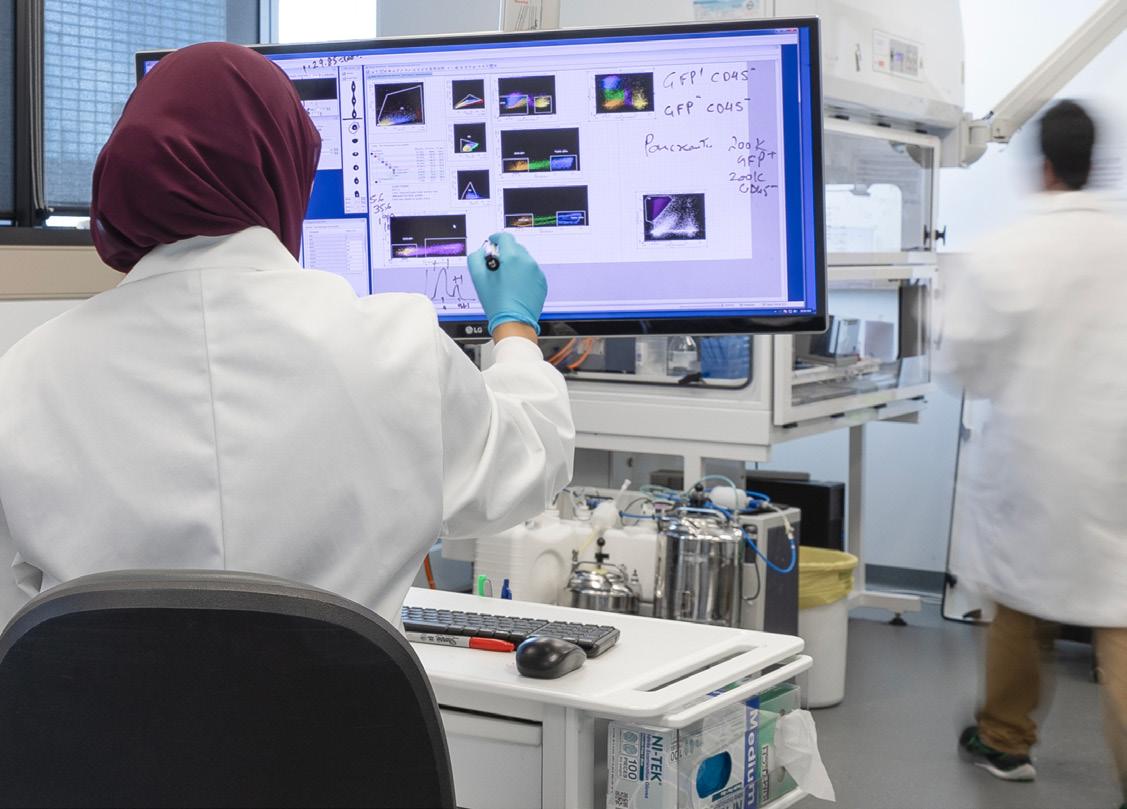
Precision Immunology
Co-Directors
Associate Professor Elissa Deenick and Professor Tri Phan
The Precision Immunology Program’s focus is to improve the diagnosis and treatment of autoimmune and immune deficient diseases, supercharge the immune response to vaccination and transform the management of allergic diseases including anaphylaxis. By investigating the molecular mechanisms that underpin immune conditions, we aim to personalise treatments to precisely target the drivers of disease.
IN 2024
We used cutting-edge techniques such as cellular immune phenotyping and fluorescence intravital imaging to solve specific clinical cases and answer long-standing research questions about the mechanisms of immune cell function and disease. We made progress towards better understanding how immune-mediated lung damage is controlled, how immune cells respond to infection and vaccination, the role of the immune microenvironment in development of melanoma, secondary immunodeficiencies in lupus patients, and the mechanisms that drive allergy. This work is uncovering new therapeutic targets, biomarkers for tracking treatment responses, and innovative ideas to optimise the immune system for cancer therapy.

BELOW: Tingible body macrophages (blue) clearing germinal centre B cells inside a lymph node after vaccination.
Credit: Dr Abigail Grootveld
Research highlights

A legacy of HOPE: The Bill and Patricia Ritchie Foundation
At the heart of some of Garvan’s most groundbreaking autoimmune research is a story of extraordinary generosity and vision. The HOPE Research Program –dedicated to understanding and treating autoimmune disease – was made possible through the generous philanthropic leadership of The Bill and Patricia Ritchie Foundation. The Ritchie family’s remarkable contributions towards advancing immunology at Garvan began more than 25 years ago. Their support notably includes the establishment of the Bill and Patricia Ritchie Foundation Chair for internationally renowned immunologist Professor Chris Goodnow in 2015, a pivotal step that brought him to Garvan.
The Foundation’s visionary support has profoundly advanced autoimmune disease research, accelerating breakthroughs that were unimaginable just a few years ago. Their leadership and belief in Garvan’s scientists have also inspired broader community engagement, helping to attract critical additional funding to realise the Program’s bold ambitions.
T cell ‘off-switch’ reveals drug targets for cancer and autoimmune disease
A newly discovered genomic signature controls whether specialised ‘killer’ T cells activate or stand down, with major implications for cancer and autoimmune disease, including 100 potential drug targets.
Killer T cells are crucial for eliminating infected or cancerous cells, but if misdirected, they can attack healthy tissue and cause autoimmune disease. To prevent this, the immune system applies a tolerance mechanism that suppresses inappropriate activation. This same mechanism can be exploited by cancer cells to avoid immune attack.
The study, led by Professor Chris Goodnow and Dr Tim Peters and published in Immunity, used advanced sequencing techniques to pinpoint genomic regions that differ between T cells activated by infection and those rendered tolerant. These previously uncharacterised sites show how immune tolerance is established and regulated at the molecular level.
The findings suggest that many cancers may resist immunotherapy by engaging this tolerance mechanism early, before immune responses are fully activated. By targeting genes involved in this pathway, future therapies could either lift this suppression in cancer, or increase it in autoimmune disease.


BELOW: Professor Christopher Goodnow and Dr Tim Peters
ABOVE: Julia Ritchie and Ruth Ritchie from the Bill and Patricia Ritchie Foundation, along with Ruth’s sons Patrick and Bill Blampied.
New hope for multiple sclerosis
The national Open Coast to Coast Australian Multiple Sclerosis (OCCAMS) consortium, led by Professor Tri Phan and Dr Seyhan Yazar at Garvan and Dr Jennifer Massey at St Vincent’s Hospital Sydney, is investigating the genetic and immune profiles of people experiencing the first symptoms of nerve damage that lead to multiple sclerosis (MS) and those of their first-degree relatives. The researchers aim to better understand the risk of developing multiple sclerosis after exposure to the Epstein-Barr Virus (EBV). Their findings could lead to early detection of MS risk, earlier intervention and ultimately preventative therapies.
In 2024, the researchers began recruiting participants and reached nearly half the study target for the first stage of the project, comparing EBV-positive and EBVnegative individuals with and without MS. The project also involves the establishment of a national biobank of blood samples.
BELOW: Dr Seyhan Yazar and Professor Tri Phan

Mapping 50,000 of DNA’s mysterious ‘knots’ in the human genome
Garvan researchers mapped more than 50,000 i-motifs – unusual knot-like DNA structures – in the human genome, revealing their likely role in controlling gene activity and their potential link to diseases such as cancer.
DNA is best known for its double helix structure, but less conventional forms like i-motifs can form under specific conditions. These four-stranded structures are formed by cytosine-rich regions folding back on themselves and protruding from the DNA strand.
Using a custom-developed antibody that binds specifically to i-motifs, researchers led by Professor Daniel Christ and Professor Sarah Kummerfeld identified their locations across the genome. The structures were found near highly active genes and in regulatory regions that control gene expression, including near oncogenes such as MYC.
The presence of i-motifs in gene promoters suggests they may serve as functional switches during the cell cycle. Their enrichment in regions linked to hard-to-treat
Advancing earlier diagnosis and treatment
As an active 24-year-old who loved playing soccer, Mark’s MS diagnosis changed the course of his life. Eleven years on, Mark's symptoms mean he relies on a wheelchair to maintain his mobility, but he remains steadfast in his mission to contribute to MS research.

As a lived experience advisor to OCCAMS, Mark offers guidance on research into MS and asks questions that clinicians and researchers may not have otherwise considered. By bringing up symptoms that may go unspoken in clinical settings, Mark also helps uncover insights and allows MS patients to find common ground. Using state-of-theart genomic technologies, OCCAMS aims to identify biomarkers in those, like Mark, with MS that could lead to early detection and preventative therapies.
I want to be involved in any sort of research that progresses the movement towards finding a cure, and OCCAMS is right at the cutting edge of MS research.”
Mark, MS lived experience advisor

Read more garvan.org.au/collaboration/ occams
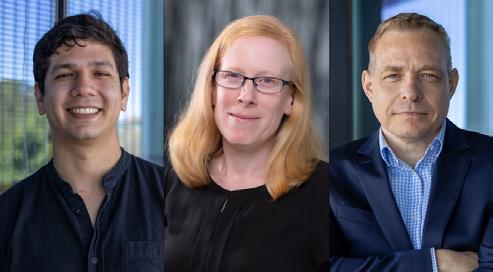
cancers presents new opportunities for drug development targeting these structures.
The findings provide a foundation for exploring i-motifs as diagnostic markers or therapeutic targets, drawing on Garvan’s expertise in antibody development and genomics.

ABOVE: Cristian David Pena Martinez, Professor Sarah Kummerfeld and Professor Daniel Christ
ABOVE: Mark, MS lived experience advisor
Recognising research excellence in 2024
This year saw our researchers honoured with major awards for their work, reflecting the depth of talent at the Institute and recognising excellence in scientific discovery to improve human health.

Australian Museum Eureka Prize
In a remarkable year of recognition, Professor Tangye was awarded the 2024 UNSW Eureka Prize for Scientific Research. This second major honour acknowledged his team’s breakthroughs in understanding rare immune diseases. Their research has contributed to the discovery of 28 previously unknown genes that cause immune disorders, and described the first cases of 13 newly described conditions in Australasia. “Each case we investigate gives us valuable insights into how the immune system functions,” explains Professor Tangye. “By studying these rare conditions, we’re not only helping affected individuals but also gaining knowledge that could benefit the broader population.”

Read more garvan.org.au/news/eureka-prize
NSW Premier’s Prizes for Science & Engineering
Two of our researchers were honoured with 2024 NSW Premier’s Prizes, recognising their valuable contributions to medical science. Professor Stuart Tangye received the Prize for Excellence in Medical Biological Sciences for his work in

understanding the human immune system and rare immune disorders. His leadership has brought together experts from across Australia and beyond through the Clinical Immunogenomics Research Consortium Australasia (CIRCA), helping patients receive faster diagnoses and better treatments for complex genetic immune conditions.
Dr Ira Deveson was named Early Career Researcher of the Year for his innovative work in genomics. During the COVID-19 pandemic, his team developed new methods to track variants of the virus, while also advancing techniques to diagnose genetic diseases. His collaboration with the National Centre for Indigenous Genomics shows his commitment to making sure new medical technologies benefit all communities equally. “Genomics is evolving so rapidly, and we’re riding that wave to tackle some of medicine’s most persistent challenges,” said Dr Deveson.
: Professor Stuart Tangye and Dr Ira Deveson

Read more garvan.org.au/news/ nsw-premier-prize
RIGHT
LEFT: Professor Stuart Tangye
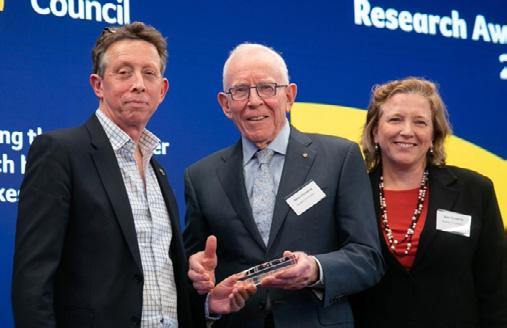
ABOVE: Professor Peter Croucher accepting the Sally Crossing AM Award
Sally Crossing AM Award
Professor Peter Croucher received the 2024 Sally Crossing AM Award from Cancer Council NSW for his pioneering research on the mechanisms that allow metastatic cancers to lie dormant in bone before reawakening. His work has changed how we treat multiple myeloma, a type of blood cancer that affects bone, after his team discovered that a drug called zoledronic acid could protect bones from damage and significantly improve survival rates. This finding led to changes in treatment worldwide, with the drug now included in standard of care guidelines.
Building on this success, Professor Croucher’s team has made breakthrough discoveries about how cancer cells ‘sleep’ in bones and what wakes them up. They’ve identified key genes involved in this process, opening up possibilities for new treatments.

Read more garvan.org.au/news/ sally-crossing-am-award
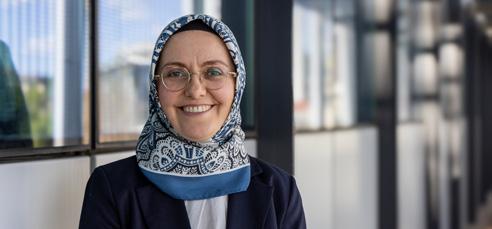
ABOVE: Dr Seyhan Yazar
Inaugural Jacqueline Goodnow and Barbara Hartley Prize
The Jacqueline Goodnow and Barbara Hartley Prize, established in 2024 by Professor Christopher Goodnow and Dr Suzanne Hartley in honour of their mothers, celebrates and enables bold women in science at Garvan.
Dr Seyhan Yazar, its first recipient, works at the intersection of biology and computer science, breaking new ground in medical research by generating a library of genetic markers to precisely target and treat autoimmune diseases. The selection committee was impressed by her innovative approach and determination to overcome challenges.
Other awards in 2024
Professor Susan Clark
Professor Susan Clark’s contributions to epigenetics research were recognised by the Australasian Epigenetics Alliance (AEpiA) through the establishment of a new award in her name “The Susan Clark Medal”
Dr Venessa Chin
Garvan’s NextGen Emerging Leaders Prize
Dr Jennifer Snaith and Allegra Angeloni
UNSW Dean’s Award for Outstanding PhD Thesis
Dr Marcia Munoz
2025 Dan Kastner Award from the International Society for Systemic Autoinflammatory Disease
Abigail Grootveld
the Australian and New Zealand Society for Immunology’s 2024 Pfizer New Investigator Prize, and Garvan’s best PhD thesis prize
Dr Etienne Masle-Farquhar
the Australian and New Zealand Society for Immunology’s 2024 Breakthrough Award to support his osteoarthritis research program
Christopher Jara
the Australian and New Zealand Society for Immunology’s 2024 Best Overall Student Poster Prize and Workshop Best Oral Award
Lachlan Gray
the Australian and New Zealand Society for Immunology’s Workshop Best Oral Award
Dr Hasindu Gamaarachchi
2024 ‘Torsten Seemann’ Outstanding Bioinformatics Software Developer Award from the Australian Bioinformatics and Computational Biology Society, recognising an outstanding early or mid-career bioinformatics software developer
Lilly Hatwell
won the UNSW 3 Minute Thesis competition and inaugural UNSW Founders Award
Dr Jennifer Snaith
2024 ADS Rising Star Award in Type 1 Diabetes Research from the Australian Diabetes Society
Scientific Platforms
Our research is empowered by our Scientific Platforms, which position Garvan at the cutting edge of technology and continually push the boundaries of what can be achieved.

Garvan
Genomics
Following a strategic review in early 2024, the Cellular Genomics Platform and the Garvan Sequencing Platform were merged to form the Garvan Genomics Platform. Combining the strengths of both its predecessors, the new Platform leads in providing cutting-edge genomic sequencing, the latest singlecell and spatial technologies and advanced flow cytometry services.
KEY HIGHLIGHTS IN 2024
The Platform acquired major new technologies, including the Cytek Aurora cell analyser for spectral cytometry, the S2 Genomics Singulator for efficient single-cell preparation and the Australasia-first PacBio Onso to expand our high-accuracy short-read sequencing capabilities.
We launched a pilot grant scheme in collaboration with PacBio, supporting genomics research across Australia and New Zealand. Five successful applications to the scheme will begin in 2025.
In December, the Platform achieved a key milestone by becoming a certified 10x Genomics Trained Xenium Service Provider for spatial services.
Data Science
The Data Science Platform enables data-intensive medical research by providing cloud infrastructure, software solutions and advanced data analysis through machine learning and statistics. It plays a key role in national genomics initiatives, developing and deploying software for large-scale computation.
KEY HIGHLIGHTS IN 2024
Grant-success including $2M from BioCommons to expand development of national-scale systems that manage genomics data.
Successful migration of Garvan’s research data from end-of-life on-premise servers to the commercial cloud and national high performance compute infrastructure
Cross-institute bioinformatics training including 12 courses with more than 120 attendees covering fundamentals of programming, introduction to high performance computing and specialised computational biology courses.
Development of AI-based tools for analysis of intravital microscopy images
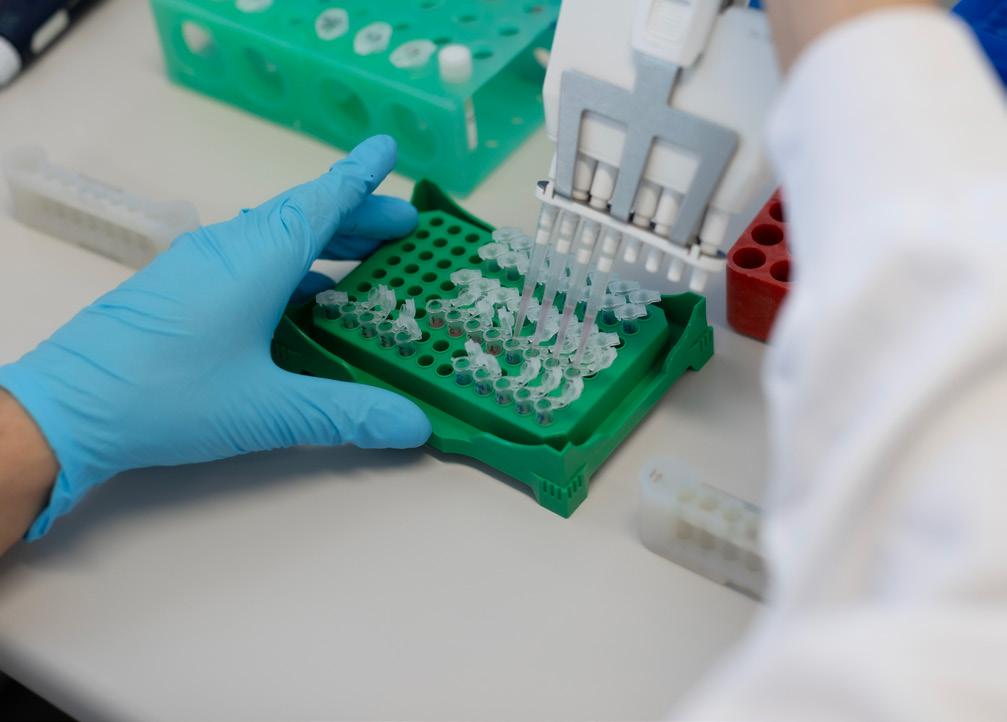
Biologics
The Biologics Platform accelerates the discovery and development of next-generation protein-based technologies across therapeutics, diagnostics and research tools. By partnering with internal labs, the platform delivers engineered molecules that enable disease targeting, immune modulation and mechanistic research.
In addition to supporting fundamental studies, the platform plays a critical role in bridging early discovery with translational science, laying the groundwork for a future therapeutic pipeline with commercial potential. By integrating with Garvan’s genomics, imaging and data science capabilities, it drives innovation from discovery to preclinical development, advancing antibody therapeutics into clinical applications to improve human health.
KEY HIGHLIGHTS IN 2024
Completed first phage display campaign targeting a protein relevant to small cell lung cancer.
Initiated bispecific antibody programs with two Garvan research groups; constructs are currently under in-house evaluation.
Launched new collaborations across oncology, immunology and genomics to expand the discovery pipeline.
Delivered custom reagents and assays to support mechanistic studies in cancer and immune-related diseases.
Advanced foundational work to enable future diagnostic and therapeutic translation from internal discovery efforts.
Therapeutic antibody classes currently in development at Garvan
Development
The Development Platform was established to accelerate the translation and commercialisation of Garvan’s most promising research. Designed around milestone-driven funding, go/no-go decision points, and flexible commercialisation pathways, the platform empowers researchers with strategic guidance, market analysis and operational expertise.
By bridging early-stage discovery with development-readiness, it ensures highpotential projects are positioned for realworld impact.
KEY HIGHLIGHTS IN 2024
Dr Rachel Galimidi was appointed Head of the Development Platform and led the creation of a structured operational model to guide project intake, evaluation, and translational support. The platform identified key capabilities, personnel needs, and governance frameworks required for long-term scalability. To validate this model, three pilot projects were selected, reflecting the breadth of Garvan’s translational ambition:
Antibody engineering to eliminate autoreactive B cells in autoimmune disease (Professor Christopher Goodnow, Dr Daniel Suan).
Precision small molecule development targeting oncogenic signaling pathways (Dr David Croucher, Dr Sharissa Latham).
Replacement therapy formulation for mevalonate kinase deficiency, a rare autoinflammatory condition (Professor Mike Rogers, Dr Marcia Munoz).
Imaging
The Imaging Platform provides access to advanced microscopy and preclinical imaging expertise. It houses Australia’s largest fleet of intravital microscopes, enabling the visualisation of dynamic cellular states in disease models.
The platform’s team supports researchers from experimental design to analysis and pioneers new imaging methods through R&D projects.
Clinical
Translation and Engagement
The Clinical Translation and Engagement (CT&E) Platform is an interdisciplinary team of genetic counsellors, psychosocial and clinical researchers. The Platform provides a pathway for researchers to meet their ethical obligations and return actionable results to patients. When research participants are informed of clinically significant genetic variants, they and their family members can undertake evidence-based risk management strategies to reduce the likelihood of disease onset or progression. These strategies ultimately aim to decrease diseaserelated morbidity and mortality.
The benefits of consumer and community involvement in research are widely recognised and funding bodies are increasingly requiring evidence of consumer involvement in research grant applications. The CT&E Platform established the Garvan Consumer and Community Involvement (CCIR) in Research program to ensure CCIR becomes a standard of our research.
KEY HIGHLIGHTS IN 2024
The platform expanded capabilities with a high-content screening system for automated analysis of cellular models and 3D organoids, enabling large-scale discovery and validation pipelines.
We acquired an Akoya Phenocycler to enable precision tissue mapping and visualise up to 100 proteins in tissue samples revealing cellular interactions in complex tissue microenvironments. This cuttingedge technology supports research from fundamental discovery to clinical translation, including drug development pipelines and preclinical studies.
KEY HIGHLIGHTS IN 2024
The Platform reached the milestone of having engaged with more than 400 research participants, to facilitate the return of individual research results.
The Consumer and Community Involvement in Research Program was launched to facilitate meaningful partnerships between researchers and consumers, to drive communication and involvement and to build a framework that ensures involvement becomes embedded in Garvan’s research.


To learn more about our scientific platforms
Celebrating Higher Degree Research
In partnership with UNSW Sydney, Garvan is committed to supporting Higher Degree Research training of our PhD and Master of Science students in advancing scientific knowledge. We ensure academic standards are achieved, so that Garvan’s emerging young researchers go on to become future leaders in their fields.
In 2024, we celebrated another exceptional cohort of graduates. Their collective work continues to strengthen our research community and build our expertise in genomics, cancer research and immunology.
As we celebrate their achievements, we remain dedicated to providing the training and resources that enable our graduates to contribute to the future of healthcare.
In 2024
104
Higher degree research students hosted at Garvan
31
Clinicians undertaking higher degree research at Garvan
79
Garvan researchers supervising PhD students
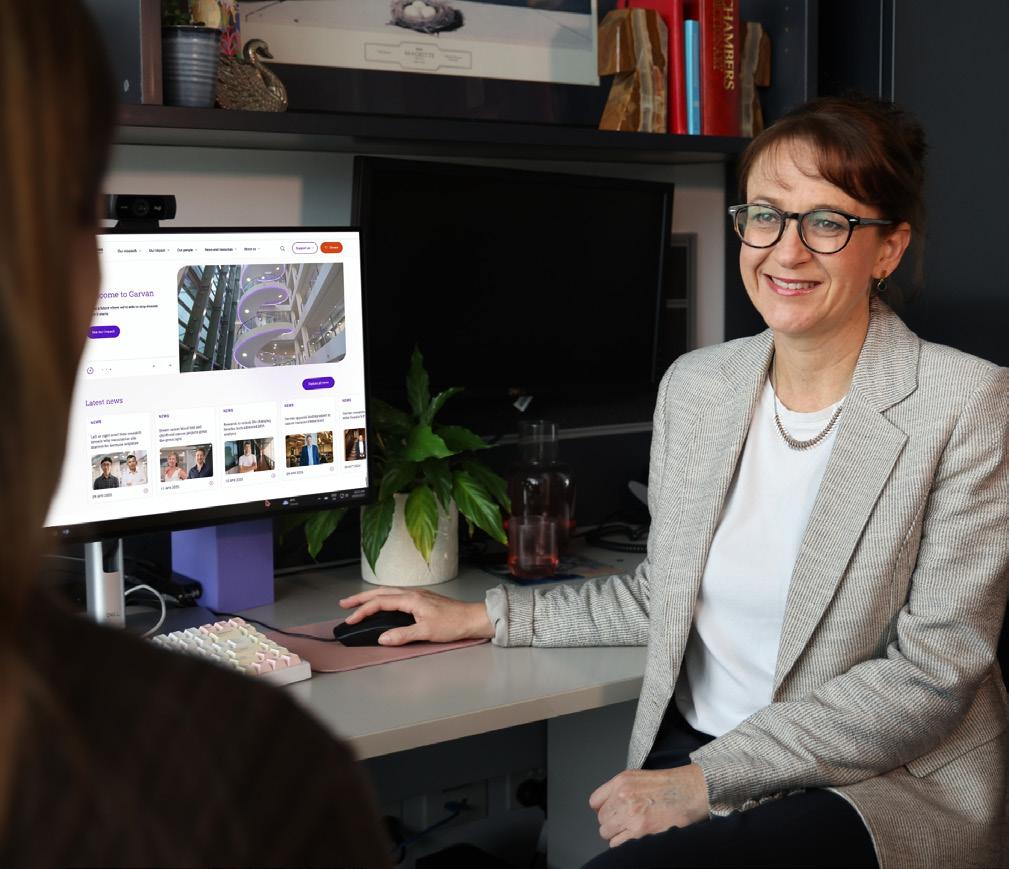
BELOW: Dr Tracy Anderson, Manager HDR Students and Supervision
Doctor of Philosophy (PhD)
Allegra Angeloni
Supervised by Ozren Bogdanovic, Ksenia Skvortsova & Irena Voineagu
DNA methylation in evolution, development, and disease
Eva Apostolov
Supervised by Alexander Swarbrick, Daniel Roden & Holly Holliday
Deep insights into the cellular and molecular milieu of hormonetherapy naïve localised PCa using scRNA-seq
Olivia Ciampa
Supervised by Liz Caldon, Elgene Lim & Sarah Alexandrou
Characterising the senescence response and its therapeutic implications in ER+ breast cancer
Emma Fletcher
Supervised by Michael Rogers & Marcia Munoz
Defining the effects of bisphosphonate drugs on tissueresident macrophages
Abigail Grootveld
Supervised by Tri Phan & Robert Brink
Investigating the origin and cellular dynamics of Tingible Body Macrophages
Hui Min Hor
Supervised by Alexander Viardot & Lesley Campbell
Are GLP-1 Receptor Agonists safe in Prader-Willi Syndrome? A detailed investigation on safety and efficacy with a focus on gastric emptying
Christopher Jara
Supervised by Joanne Reed, Christopher Goodnow, Robert Brink & Etienne Masle-Farquhar
Investigating tolerance of a crossreactive human autoantibody: Distinguishing self and foreign antigens
Candy Laurianto
Supervised by Robert Brink & Tri Phan
Genetic manipulation of lymphocytes in germinal centre responses
Nele Lenders
Supervised by Ann McCormack, Jerry Greenfield, Warrick Inder & Peter Earls
Towards precision medicine for pituitary tumours
Joseph Mackie
Supervised by Stuart Tangye, Cindy Ma & Antoine Guerin
The spectrum of inborn errors in STAT3: Impact on cytokine-mediated adaptive immune responses in humans.
Benjamin McLean
Supervised by Marina Pajic & Sean Porazinski
Effective Co-Targeting of Fibrotic and Immune Microenvironments to Improve Overall Anti-tumour Response in Models of Advanced Pancreatic Cancer
Cristian Pena Martinez
Supervised by Daniel Christ & Sarah Kummerfeld
Characterisation of DNA i-motif structures in the human genome and the role of non-canonical nucleic acid structures
Zoe Phan
Supervised by Liz Caldon, Caroline Ford & Leila Eshraghi PARP inhibitors: beyond maintenance therapy
Daniel Reed
Supervised by Paul Timpson, David Herrmann & Liz Caldon
Investigating the ROCK2 signalling axis as a stromal and epithelial target in triple-negative breast cancer
Jemma Rezitis
Supervised by Herbert Herzog, Chi Kin Ip & Robert Brink
A Novel Neuropeptide Y Network Regulating Hedonic Eating Behaviours
Shona Ritchie
Supervised by Paul Timpson, Brooke Pereira & Marina Pajic
An integrated analysis of the cancer cell secretome reveals PCSK9 as a potential co-target in pancreatic ductal adenocarcinoma
Gabriela Santos Rodriguez
Supervised by Robert Weatheritt & James Blackburn
Evolutionary dynamics of post-transcriptional regulation mechanisms in vertebrates
James Sligar
Supervised by Andrew Philp, Dorit Samocha Bonet & David Ross Laybutt
The Importance of Mitophagy for Healthy Ageing
Jennifer Snaith
Supervised by Jerry Greenfield & Jane Holmes-Walker
Insulin Resistance and Metformin in Type 1 Diabetes
Laura Yeates
Supervised by Jodie Ingles, Chris Samsarian & Alison McEwen
Caring for families affected by inherited cardiovascular conditions and sudden cardiac death
Taopeng Wang
Supervised by Alexander Swarbrick, Sandra O'Toole & Daniel Roden
Adoption and implementation of single-cell and spatially resolved transcriptomic technologies for metastatic breast cancer research
Master of Science (Research)
Luke Ardolino
Supervised by Lisa Horvath, Anthony Joshua & Hao-Wen Sim
Targeting the actionable circulating lipid signature in men with metastatic prostate cancer using systemic metabolic therapies
Our 2024 cohort of PhD graduates at Garvan has demonstrated exceptional dedication to advancing healthcare through their research. Their work reflects the strength of our research program and its growing impact.
Board of Directors
Garvan is governed by two Boards who provide strategic leadership and oversight. Their expertise and commitment are essential to our progress and impact.
Garvan Institute of Medical Research
Our Board of Directors at the Garvan Institute of Medical Research donate their time and expertise. They are responsible for policy development and effective governance of the Institute’s affairs
Mr Scott Perkins (Chair) Nominated by St Vincent’s Hospital Trustees
The Hon Dr Annabelle Bennett AC SC Nominated by St Vincent’s Hospital Trustees
Professor Merlin Crossley (from 28 February 2024) Nominated by Council of UNSW Sydney
Professor Philip Cunningham OAM (until 30 September 2024) Nominated by Sisters of Charity
Mr Stephen Johns (Treasurer) Nominated by Garvan Research Foundation
Dr Paul Kelly Nominated by St Vincent’s Hospital Trustees
Professor Benjamin Kile Nominated by Garvan Board of Directors
Dr Robert Marshall Nominated by Sisters of Charity
Ms Anna McFadgen Nominated by Sisters of Charity
Dr Helen Nugent AC (until 6 May 2024) Nominated by NSW Minister for Health
Professor Roger Reddel AO
Nominated by Minister of State for Health of the Commonwealth
Dr Russell Scrimshaw AM Nominated by Minister of State for Health of the Commonwealth
Ms Jillian Segal AO (until 30 September 2024) Nominated by Council of UNSW Sydney
Professor Ronald Trent Nominated by NSW Minister for Health
Garvan Research Foundation
Our Garvan Research Foundation Board was established in 1981. They oversee the effective marketing and fundraising activities of the Garvan Research Foundation, ensuring Garvan’s innovative research is supported.
Dr Russell Scrimshaw AM (Chair)
Mr Nick Abrahams
Ms Jane Allen
Mr Michael Cannon-Brookes
Ms Susan Cato AM
Mrs Wallis Graham
Mr Rajeev Gupta
Ms Maria Halasz
Mr Bruce Liu
Ms Sally Loane
Mr John Meacock
Professor Cav Simon Mordant AO
Mr Greg Paramor AO
Dr Geoffrey Raby AO
Ms Isabella Rich
Ms Ruth Ritchie
Professor Benjamin Kile (ex officio)
Mr Scott Perkins (ex officio)
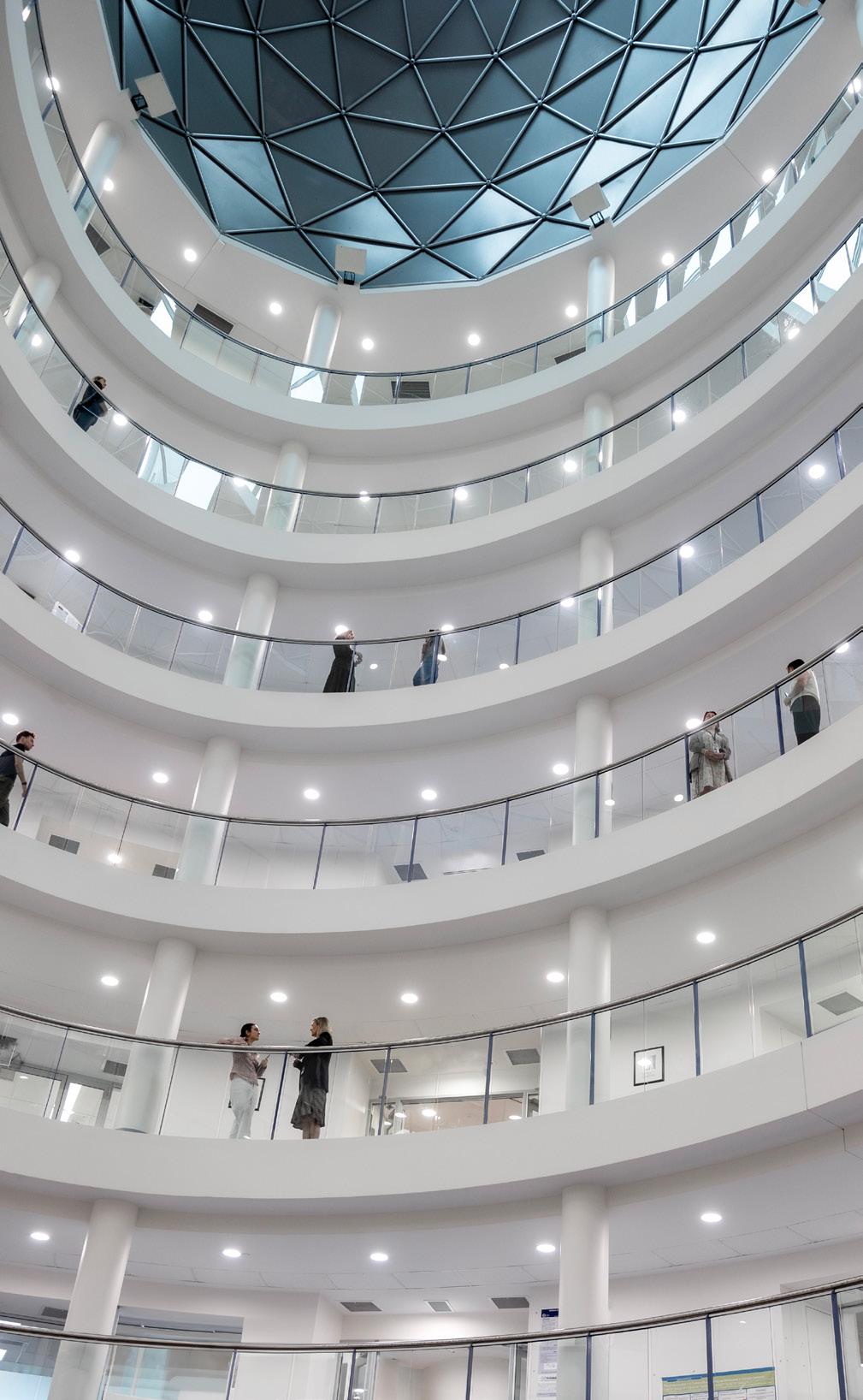
Shaping Discovery
Our most significant research publications
In 2024, Garvan researchers published discoveries across a wide range of diseases. These discoveries enhance scientific progress and ensure that our research findings are accessible to the broader community, driving collaboration and innovation.
At Garvan, we turn public support into public knowledge – conducting medical research that not only advances science but also empowers the public through shared understanding.
The following page lists our most significant research publications with an impact factor of 10 or higher.

Garvan
Achinger-Kawecka J, Stirzaker C, Portman N, Campbell E, Chia KM, Du Q, Laven-Law G, Nair SS, Yong A, Wilkinson A, Clifton S, Milioli HH, Alexandrou S, Caldon CE, Song J, Khoury A, Meyer B, Chen W, Pidsley R, Qu W, Gee JMW, Schmitt A, Wong ES, Hickey TE, Lim E, Clark SJ. The potential of epigenetic therapy to target the 3D epigenome in endocrine-resistant breast cancer. Nat Struct Mol Biol 2024;31:498-512. 10.1038/s41594-02301181-7
Alarkawi D, Tran TS, Chen W, March LM, Blyth FM, Blank RD, Bliuc D, Center JR. Health Perceptions, Multimorbidity, and New Fractures and Mortality Among Patients With a Fracture. JAMA Netw Open 2024;7:e248491. 10.1001/ jamanetworkopen.2024.8491
Bliuc D, Tran T, Alarkawi D, Chen W, Alajlouni DA, Blyth F, March L, Blank RD, Center JR. Patient Self-Assessment of Walking Ability and Fracture Risk in Older Australian Adults. JAMA Netw Open 2024;7:e2352675. 10.1001/ jamanetworkopen.2023.52675
Chen W, Zeng YC, Achinger-Kawecka J, Campbell E, Jones AK, Stewart AG, Khoury A, Clark SJ. Machine learning enables pan-cancer identification of mutational hotspots at persistent CTCF binding sites. Nucleic Acids Res 2024;52:8086-99. 10.1093/nar/gkae530
Emmett L, Subramaniam S, Crumbaker M, Nguyen A, Joshua AM, Weickhardt A, Lee ST, Ng S, Francis RJ, Goh JC, Pattison DA, Tan TH, Kirkwood ID, Gedye C, Rutherford NK, Sandhu S, Kumar AR, Pook D, Ramdave S, Nadebaum DP, Voskoboynik M, Redfern AD, Macdonald W, Krieger L, Schembri G, Chua W, Lin P, Horvath L, Bastick P, Butler P, Zhang AY, Yip S, Thomas H, Langford A, Hofman MS, McJannett M, Martin AJ, Stockler MR, Davis ID, Investigators EN-pT, the A, New Zealand U, Prostate Cancer Trials G. [(177)Lu] Lu-PSMA-617 plus enzalutamide in patients with metastatic castrationresistant prostate cancer (ENZA-p): an open-label, multicentre, randomised, phase 2 trial. Lancet Oncol 2024;25:56371. 10.1016/S1470-2045(24)00135-9
Filipe EC, Velayuthar S, Philp A, Nobis M, Latham SL, Parker AL, Murphy KJ, Wyllie K, Major GS, Contreras O, Mok ETY, Enriquez RF, McGowan S, Feher K, Quek LE, Hancock SE, Yam M, Tran E, Setargew YFI, Skhinas JN, Chitty JL, Phimmachanh M, Han JZR, Cadell AL, Papanicolaou M, Mahmodi H, Kiedik B, Junankar S, Ross SE, Lam N, Coulson R, Yang J, Zaratzian A, Da Silva AM, Tayao M, Chin IL, Cazet A, Kansara M, Segara D, Parker A, Hoy AJ, Harvey RP, Bogdanovic O, Timpson P, Croucher DR, Lim E, Swarbrick A, Holst J, Turner N, Choi YS, Kabakova IV, Philp A, Cox TR. Tumor Biomechanics Alters Metastatic Dissemination of
Triple Negative Breast Cancer via Rewiring Fatty Acid Metabolism. Adv Sci (Weinh) 2024;11:e2307963. 10.1002/ advs.202307963
Guerin A, Moncada-Velez M, Jackson K, Ogishi M, Rosain J, Mancini M, Langlais D, Nunez A, Webster S, Goyette J, Khan T, Marr N, Avery DT, Rao G, Waterboer T, Michels B, Neves E, Iracema Morais C, London J, Mestrallet S, Quartier Dit Maire P, Neven B, Rapaport F, Seeleuthner Y, Lev A, Simon AJ, Montoya J, Barel O, Gomez-Rodriguez J, Orrego JC, L'Honneur AS, Soudee C, Rojas J, Velez AC, Sereti I, Terrier B, Marin N, Garcia LF, Abel L, BoissonDupuis S, Reis J, Marinho A, Lisco A, Faria E, Goodnow CC, Vasconcelos J, Beziat V, Ma CS, Somech R, Casanova JL, Bustamante J, Franco JL, Tangye SG. Helper T cell immunity in humans with inherited CD4 deficiency. J Exp Med 2024;221. 10.1084/jem.20231044
Ho KKY, Fleseriu M, Wass J, Katznelson L, Raverot G, Little AS, Castano JP, Reincke M, Lopes MB, Kaiser UB, Chanson P, Gadelha M, Melmed S. A proposed clinical classification for pituitary neoplasms to guide therapy and prognosis. Lancet Diabetes Endocrinol 2024;12:209-14. 10.1016/ S2213-8587(23)00382-0
Jhaveri KL, Bellet M, Turner NC, Loi S, Bardia A, Boni V, Sohn J, Neilan TG, Villanueva-Vazquez R, Kabos P, Garcia-Estevez L, Lopez-Miranda E, Perez-Fidalgo JA, Perez-Garcia JM, Yu J, Fredrickson J, Moore HM, Chang CW, Bond JW, Eng-Wong J, Gates MR, Lim E. Phase Ia/b Study of Giredestrant +/- Palbociclib and +/- Luteinizing Hormone-Releasing Hormone Agonists in Estrogen Receptor-Positive, HER2Negative, Locally Advanced/Metastatic Breast Cancer. Clin Cancer Res 2024;30:754-66. 10.1158/1078-0432. CCR-23-1796
Johansson T, Karlsson T, Bliuc D, Schmitz D, Ek WE, Skalkidou A, Center JR, Johansson A. Contemporary menopausal hormone therapy and risk of cardiovascular disease: Swedish nationwide register based emulated target trial. BMJ 2024;387:e078784. 10.1136/bmj-2023-078784
Neavin D, Senabouth A, Arora H, Lee JTH, Ripoll-Cladellas A, sc-e QC, Franke L, Prabhakar S, Ye CJ, McCarthy DJ, Mele M, Hemberg M, Powell JE. Demuxafy: improvement in droplet assignment by integrating multiple single-cell demultiplexing and doublet detection methods. Genome Biol 2024;25:94. 10.1186/s13059-02403224-8
Ogishi M, Kitaoka K, Good-Jacobson KL, Rinchai D, Zhang B, Wang J, Gies V, Rao G, Nguyen T, Avery DT, Khan T, Smithmyer ME, Mackie J, Yang R, Arias AA, Asano T, Ponsin K, Chaldebas M,
Zhang P, Peel JN, Bohlen J, Levy R, Pelham SJ, Lei WT, Han JE, Fagniez I, Chrabieh M, Laine C, Langlais D, Gruber C, Al Ali F, Rahman M, Aytekin C, Benson B, Dufort MJ, Domingo-Vila C, Moriya K, Shlomchik M, Uzel G, Gray PE, Suan D, Preece K, Chua I, Okada S, Chikuma S, Kiyonari H, Tree TI, Bogunovic D, Gros P, Marr N, Speake C, Oram RA, Beziat V, Bustamante J, Abel L, Boisson B, Korganow AS, Ma CS, Johnson MB, Chamoto K, Boisson-Dupuis S, Honjo T, Casanova JL, Tangye SG. Impaired development of memory B cells and antibody responses in humans and mice deficient in PD-1 signaling. Immunity 2024;57:2790-807 e15. 10.1016/j.immuni.2024.10.014
Pereira BA, Ritchie S, Chambers CR, Gordon KA, Magenau A, Murphy KJ, Nobis M, Tyma VM, Liew YF, Lucas MC, Naeini MM, Barkauskas DS, ChaconFajardo D, Howell AE, Parker AL, Warren SC, Reed DA, Lee V, Metcalf XL, Lee YK, O'Regan LP, Zhu J, Trpceski M, Fontaine ARM, Stoehr J, Rouet R, Lin X, Chitty JL, Porazinski S, Wu SZ, Filipe EC, Cadell AL, Holliday H, Yang J, Papanicolaou M, Lyons RJ, Zaratzian A, Tayao M, Da Silva A, Vennin C, Yin J, Dew AB, McMillan PJ, Goldstein LD, Deveson IW, Croucher DR, Samuel MS, Sim HW, Batten M, Chantrill L, Grimmond SM, Gill AJ, Samra J, Jeffry Evans TR, Sasaki T, Phan TG, Swarbrick A, Sansom OJ, Morton JP, Australian Pancreatic Cancer Matrix A, Australian Pancreatic Cancer Genome I, Pajic M, Parker BL, Herrmann D, Cox TR, Timpson P. Temporally resolved proteomics identifies nidogen-2 as a cotarget in pancreatic cancer that modulates fibrosis and therapy response. Sci Adv 2024;10:eadl1197. 10.1126/sciadv.adl1197
Wong B, Ferguson JM, Do JY, Gamaarachchi H, Deveson IW. Streamlining remote nanopore data access with slow5curl. Gigascience 2024;13. 10.1093/gigascience/giae016

Stay at the forefront of medical science. Explore Garvan’s publications and see how our research is shaping the future of health.
garvan.org.au/publications
Competitive grants awarded in 2024

Financial Highlights
Statement of financial position for the period ended 31 December 2024

Statement of profit or loss
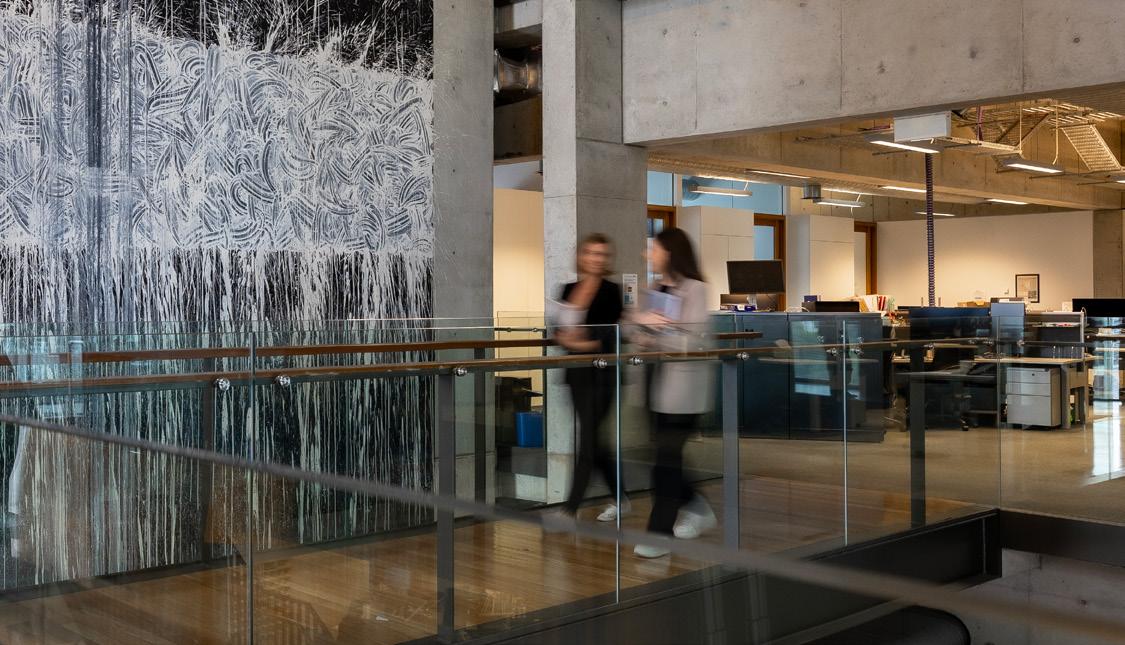
Statement of financial position
of
provided
Thank You to Our Garvan Family
Our wonderful supporters come from all walks of life and give in various ways. They each have their own reasons for supporting Garvan, but what brings them together is a shared passion for making a real difference in the fight against disease.
Our heartfelt appreciation goes to all those who supported Garvan in 2024, helping us move closer to a future where all diseases can be prevented, treated or cured.

Visionaries
Ainsworth 4 Foundation
Mr Len Ainsworth AM
Amadeus Energy Limited
Australian Cancer Research Foundation
Australian Lions Childhood Cancer Research Foundation
The CLEARbridge Foundation
John Brown Cook Foundation
Mr Charles P Curran AC
Sarah Davin and Niki Scevak
Mr & Mrs Geoff and Dawn Dixon
Education Heritage Foundation
The Late Mr Alan Elder
The Late Lady (Mary) Fairfax AC OBE
Ferris Family Foundation
In Memory of Dr and Mrs Wing Kan Fok
Ms M. Fok, Ms G. Fok, Ms V. Fok
Friends of the Garvan – USA
Mrs Janice Gibson and Ernest Heine Family Foundation
Professor Chris Goodnow and Dr Suzanne Hartley
The Patricia Guest Foundation
The R T Hall Trust
The Late Mr Philip Hemstritch Hillcrest Foundation
Life Governors
Accor
Allind Pty Limited
The Late Mr John Armati
ASX Group
ASX Refinitiv Charity Foundation
The late Mr David Baffsky AO and Mrs Helen Baffsky
Baxter Charitable Foundation
John and Anna Belfer Trust
BWM Isobar
De Lambert Largesse Foundation
Mr Peter Duncan AM and the Late Mrs Val Duncan
Richard Fenning & Wendy Volckman
Mr Laurence S Freedman AM
The Late Miss Felicia D Garvan
J Holden Family Foundation
In Loving Memory of Pieter H. Huveneers
The Johnny Kahlbetzer Family
The Late Mrs Virginia Kahlbetzer
Mrs Christina Kennedy and the Late Mr Trevor Kennedy AM
The Kinghorn Foundation
Lions Clubs International Foundation
Love Your Sister Foundation
Mr Bob Magid OAM and Mrs Ruth Magid
Mr & Mrs Roy and Cindy Manassen
Mr John McMurtrie AM and Mrs Deborah McMurtrie
NAB Foundation
The NELUNE Foundation
Ms Lysia O’Keefe
Mrs Roslyn Packer AC
Mr Greg Paramor AO and Mrs Kerry Paramor
The Paramor Family Foundation
Paspaley
The Lindsay and Heather Payne Medical Research Charitable Foundation
The Petersen Family
Petersen Family Foundation
The Petre Foundation
The Lady Proud Foundation
Rosemary Pryor Foundation
Ridley Corporation Ltd
The Bill and Patricia Ritchie Foundation
Mr Peter Rockey
Mrs Margaret Rose AM
The Ross Trust
Mr John Roth and Ms Jillian Segal AO –
The Yarranabbe Foundation
Mr Alan Rydge AM and Mrs Lynne Rydge
Mr Richard Scheinberg AM and Mrs Jacqui Scheinberg
Scrimshaw Foundation
Snow Medical Research Foundation
The Late Mr Laurie Sutton AM and Mrs Di Sutton
Suttons Motors Management
Charlie Teo Foundation
Tour de Cure
TPG Telecom Foundation
St Vincent’s Curran Foundation
Mr & Mrs John and Megan Wade
Wade Civil Engineering Pty Ltd
The Walker Family Foundation
The Late Mr Lang Walker AO and Mrs Sue Walker
The Late James Patrick Garvan and Family
Mrs Agnes Ginges and the Late Mr Berel Ginges
The Late Mr Cyril Golding
The Goodridge Foundation
Mr William A Gruy
Mr & Mrs Paul and Judy Hennessy
Dr & Mrs Francis and Marie Hooper
Mr & Mrs Ralph and Lorraine Keyes
King & Wood Mallesons
Mr Fred “Frog” Moore
National Australia Bank
NSW Ministry of Health
Dr Graham O’Neill
The Rodney & Judith O'Neil Foundation
The Late Mr K Packer AC
George Patterson Pty Ltd
Perpetual Foundation –
The Kibblewhite Endowment
Roth Charitable Foundation
Mr & Mrs Tim and Sally Sims
Skipper-Jacobs Charitable Trust
The Late Mr Robert Strauss MBE
The Late Dr John Tonkin
Twin Towns Services Community Foundation Limited
Westfield Holdings Ltd
Mr Brian White AO and Mrs Rosemary White
E J Whitten Foundation
Witchery
Wood Family Foundation
Governors
The David & Fee Hancock Foundation
Joseph Palmer Foundation
Benefactors
Kimberly and Toby Allen
Dr John & Mrs Anne Chong
In Memory of Carla Griffiths
GW Foundation
David & Dulcie Henshall Foundation
Phillip and Carol Isaacs
Kedje Foundation
The Lewis Foundation
Supporters
The Abey Perera Family Foundation
Alter Family Foundation
Mrs Karin Amneus
The Angles Family Foundation
Ms Janet Anthes
Peter and the late Andrea G.W.
Armstrong
M M Atkinson
Nicola Barbieri
John Barbour Estate
Baudish Family Foundation
Mrs Dorothy Baylis and the Late John Baylis
Berg Family Foundation
Mr Alexander Berlee
Ms Valeska Bloch
Mr Doug Brenkley
The Broinowski Foundation
Philip & Wendy Brook
Mr & Mrs Andrew & Kate Buchanan
Mr Sean Buck
Ms Carolyn Bunney
In Memory of Frank & Dorothy Burnett
Caesar Family
Hon. Joseph Campbell KC & Mrs Jenny Campbell
Mr Leigh Campbell
Mr Michael Cannon-Brookes and Mrs
Helen Cannon-Brookes
Carcione Foundation in memory of Maria Caputo
Tony Carr Foundation
Centenary Foundation - The Judith Hodge Fund
Anthony Cerreto
The Charalambous Family Foundation
Joe Cho
Mr Jeromy Claridge
Coflink Pty Ltd
V & C Comino Foundation
The Corio Foundation
Croall Foundation
Cure Cancer Australia
Mrs Roslyn Currie
Donus Australia Foundation Ltd
Eastern Suburbs Legion Club Ltd
Mr George Edwards
Essential Energy
The Estée Lauder Companies
Ms Susan Evens
E-Z-Go NSW
Mr and Mrs Quentin and Kim Flannery
John Forsyth AM and Ann Verschuer
Logan Family Foundation in Memory of Gail Marie Logan
William Lynch Memorial Fund
Macoun Charitable Foundation
Nelumbo Trust Fund
Mr & Mrs Jim & Fran Sweeny
Tour de Rocks
Ms Sally White OAM
Mr Bill Fu
Fugen Constructions
Mrs Bunny Gardiner-Hill
Mr Timothy Gearing
Dr Dawn Giltinan
Miss Elizabeth Goodman
Alan Goodwin
Graf family
Ms Lorette Graham
The Grand Court of NSW, Order of the Amaranth Inc
Dr Leslie Green and Mrs Ginny Green
Melissa and Jonathon Green
Sharon Green and Marcel Skjald Endowment
Mrs Gina Grubb
In Celebration of Madeleine and Justin Gutman’s Wedding
G P Harris Foundation
The Hayes Family
Mrs Yvonne Hazell OAM
Sally Herman OAM
Margaret Heuer
The Highfield Foundation
Ms Gillian Horwood
Mrs Sue Howieson
Mr & Mrs Ian and Jenny Hume
Idle Acres Foundation
Inveruglas Pty Ltd
Dr George Jacobs and Dr Janice Hirshorn
The Hon. Peter Jacobson KC
Ms Beverley James
Mr Graeme Jilbert
Professor Anthony Joshua
Mrs Elizabeth Keam
Mrs Beryl Keane
In Memory of Helen and Murray Keir
Professor Geoffrey Kellerman AO
Mr Geoffrey H Kimpton
Mr Kerry King
Mr Justin Kirkwood
Mr Samuel L Kushe
Mr V Lam
Peter Lamble
Mr Niall Lenahan
David Lesnie Foundation
Mr Anthony Little
Mr John B Little
Lord Mayor’s Charitable Foundation
through the Eldon & Anne Foote Trust
Lowaldie Investments Pty Ltd
Mr Anthony Lucas

Medical research saved Karen’s life.
Now she’s on a mission to help others.
In 2020, Karen received a bowel cancer screening kit she almost dismissed. After a routine colonoscopy less than a year earlier returned clear results, she had no immediate health concerns. But on a whim, she completed the test – a decision that ultimately saved her life.
Her results showed signs of faecal occult blood, leading to a devastating diagnosis of rectal cancer. Over two years, Karen underwent chemotherapy, radiotherapy, major surgery and, later, more treatment when cancer spread to her liver. Throughout it all, she kept her sense of humour and grew determined to support the research that gave her hope.
Now cancer-free, Karen is one of our proud Partners for the Future, choosing to leave a gift in her Will to drive life-saving discoveries.
“It’s my way of honouring what I went through and supporting the researchers whose work saved my life,” she says.
Instead of Christmas gifts, Karen now asks her family to donate to Garvan. “We’re not all billionaires, but lots of small contributions add up. If every Australian gave $50, imagine what we could achieve.”
Today, Karen’s story stands as a testament to early detection, cuttingedge research and the incredible community of supporters who fuel Garvan’s mission to transform lives.

garvan.org.au/ karens-story
Ms Sandra Lucas
Helen Lynch AM and Helen Bauer
Dr Lee MacCormick Edwards Charitable Foundation
Masfor Group Pty Ltd
Ms Patricia McAleer
In Memory of Terry McGuinness
The McNally Foundation
Menika Lanard Jandd Charitable Foundation
Nick & Caroline Minogue Foundation
Mostyn Family Foundation
In Loving Memory of Finbarr O'Farrell
Ms Janette Mary O'Neil
Mr & Mrs Julian & Anne O'Neil
Optiver
Pathfinders
In Loving Memory of Hazel Paton
Mrs Joan Pearson
Mr John Peaty
The Penn Foundation
Perpetual Group
Perpetual Foundation - The Henry and Patricia Dean Endowment Fund
Perpetual Foundation - Marles & Manning
Charitable Endowment
Perpetual Foundation - The Felicia Garvan Endowment
Fundraisers
Loui Abouhamad
Mrs Madonna Arca
Australian Tunnelling Society
In Memory of Peter Watson
Heart of the Green- In Loving Memory of Joshua Avvenevole
Ms Katy Barr
In Celebration of Isabella Rich and Ben Barzach’s wedding
Belmadar Pty Ltd
Rebecca Burn and Family in Memory of Aunt Danuta
Caesar Family
Mr Luke Civitarese
Forster Tuncurry Lady Veteran's Golf
Mr & Mrs Nick and Maryanne Gagliano
In Celebration of Madeleine and Justin Gutman’s Wedding
Ms Maria Halasz
Perpetual Foundation - The Stombuco
Family Legacy Endowment
Ms Anne Phillips
Henry Pollack Foundation
Malcolm Powell
Betty L Price
Qualtrics
Ms Susan Rainsford
Jennifer and Roy Randall
Ms Jane Rich
Mr Angus Richards
Mr Ken Richards
Reg Richardson AO
Mr & Mrs Stuart & Christine Robertson
In Memory of Roger Rose
Mr Bruce Rosenberg
Mr Jerry Ryan
Miro Rybar
Mr Robin Sanderson & Ms Anne Coffey
Avrom and Lindy Sank
Mr Stuart Schaefer
David and Eva Scheinberg
Mrs & Mr Juliet and Conrad Schmidt
Mr & Mrs Tony and Laurelle Simpson
Ski and Board UTS
J & D Sly
Mr Donald Smith
Daniel Ianni
Mr Matt Johnson
Kingsley-Woodvale Lions Club
Tammy Vi Thieu Lee
Lions Club of Singleton Lioness
Love Your Sister Foundation
In Loving Memory of Steven Maartensz
March for Mick - In Loving Memory of Michael Sobey
The Marrocco Family - In Memory of our Beloved Domenico Marrocco
Tribute to David Middleton
Mrs Michelle Mitchell
Stephanie Murphy
Newport Surf Club
Pambula Merimbula Golf Club
Ms Phillipa Parsons
In Loving Memory of Anna Pelosi
Jessica Rose
Mrs Jennifer M Smith
In Loving Memory of My Beautiful Mother
Goldie Stern
Maureen Stevenson
Mr & Mrs Peter and Diane Sturrock
Mr Nick Tait OBE and Mrs Mimi Tait
Mr Harry Tamvakeras
Mr Bill Taylor
Mrs Joy Timbrell
Ms Heather Trussell
The Universal Zone Pty Ltd
Mr Ian Vale
Wade Family Trust
The Wales Family Foundation
Mr Robert J Walsh
Richard and Susan Warburton Foundation
Ken Warriner Foundation
Webb Family
Mr Howard Welsh
Westpac Banking Corporation
Mr Geoffrey White OAM
Ms Lynette Wilkinson
William Grants & Sons Australian Pty Ltd
Mr J M Yorke
John S Young
Troy Rowe
Mr Nate Ryan
Ski and Board UTS
Mrs Linda Sobey - In Loving
Memory of Michael Sobey
Mr Todd Sobey
Mr Matthew Stafford
Mr Tim Sullivan
In Loving Memory of Alexandra Thoms
Ms Michelle Uhlhorn
Volunteers
Ms Justine M Flynn
Miss Lyndie Hemery
Mr Howard Houliston
Mrs Mairi Payten
Mrs Annie Selman
Mr Ken Webber

Partners for the Future
There are many ways in which our generous community contributes to Garvan’s research, from monthly gifts to gifts in Wills. We are truly grateful to every single member of our Garvan family for all that they do and continue to do to ensure a future where all diseases can be prevented, treated or cured.
Mrs Margaret E Abercrombie
Ms Jane Adams
Mrs Margaret Adams
Ms Ronelle Adams
Mr Ray Addison
Mr Richard Aldridge
Dr Lyn Allen
Mr Ken Allen AO and Mrs Jill Allen
Mrs Linda Anderson
Ms Lisa Annand
Mr Kerry Anthony
Mr Roger Arena
Mr Ian A N Armstrong
Peter and the late Andrea G.W. Armstrong
Mr Peter Askew
Margaret Atkinson
Australian Ladies Variety Association Inc
Mr John Avigdor
Ms Melissa J Ball
Ms Denise Bamford
Ms Jane Banfield
Mr & Mrs Joseph and Elizabeth (Betty) Banhidi
Mr David Barclay
Mr & Mrs David and Robyn Barnett
Miss Evelyn Barnett
Patricia Barnett
Mr Wal Barrett
Mrs Katharine Barter
Mr Keith Barton
Mrs Esther Bartram
In Loving Memory of Eileen
Mrs Karen D Beales
Mr Ross L Beattle
Mr & Mrs Barry and Jennifer Beck
Ms James Belger
Ms Elizabeth Berger
In Loving Memory of Tommie Bergman
Ms Suzanne Bestwick
Ms Helen Biddle
Ms Patricia Billing
Mr Trevor Bingham
Ms A Blake
Mr Ted Blamey
Peter Bolton & Alan Barnes
Mrs Josephine Boniface
Ms Linda Booth
Mr Stephen Borland
Mr Ronald E Boston
Mr Maurice Bourke
Mr Jeff Bower
Ms Maree Bowman
Mrs Meryl Bowman
Mrs Helen Boyd
Alan Boyle and the late Anne Boyle
Dr Patrick Bradbery
Mrs Barbara E J Brazier
Mr Robert Breakwell
Mr Peter Brell
Ms Robyn Bressington
Mrs Meredith Briggs
Mr Selwyn Brindley
Robert Brisbane
Ann Bristow
Ms Julie Britchford
Mrs Jo-Ann Brittain
Philip & Wendy Brook
Ms Wendy Brooke
Ms Avril Brown
Dr Rebecca A Brown
Mr Norman J Brownlaw
Ms Barbara Bryan
Emeritus Professor Ken A Buckle
Mr Maikeli Bukasila
Mrs Anne Bunga
Mrs Elizabeth Bunyan
Dr Michael & Mrs Jennifer Burgess
In Memory of Frank & Dorothy Burnett
Miss Laura Burns
Mr John Burton
Ms Geraldine Butler
Mrs Barbara E Buttery
Mr James Callachor
Mrs Sandra Cameron
Dr John Campbell
Hon. Joseph Campbell KC & Mrs Jenny
Campbell
Ms Margo Canavan
Ms Maria J Capner
Ms Leigh Carnsew
Ms Rebecca Cartwright
Ralph and Marie Cashman
Rose-Mary Cassin
Dr Carla Ceccarelli
Mr Arthur Cheesman
Ms Margaret Chibnall
Dr John & Mrs Anne Chong
Ms Sue E Chong
Ms Rhonda Christie
Mrs Janet Churches
C E Clark
Ms Janine E Clark
Mr Brian A Clarke
Ms Jill Coggan
Andrea Beattie & Julian Coghlan
Ms Anita Cohen
Dr & Mrs Roger and Carole Cole
Jeffrey Robert Collings
Jennie Collins
Mrs Jutta I Collins
Ms Heather Collyer & Max Hodgson
Phillip Combe
Mr Godfrey James Comrie
Mrs Kylie Conaghan
Dr Lynne Cook
Ms Patria R Cook
Ms Dorothy Coombs
Mrs Isobel Cooper
Edda Cosmo
Dr Rachel Costa
Miss Jacqueline Dean
Ms Cheryl Craig
Brett Crittenden
Mrs Philippa Croker
Mrs Emilia Cross
Mr Michael Crowley
Ms Patricia Croxon
Cary Cullen
Ms Maureen Curcic and Guy Curcic
Mrs Roslyn Currie
Ms Roanne Dagg
Mrs Lois Dann
Mr Rodney F Darke
Mr & Mrs Kevin and Sylvia Davies
Ms Jennifer Davies
Mr Michael Davies
Mr Don and Mrs Cristine Davison
Miss Clare Dawes
Mrs Julie Dawson
Ms Leh Day
Mr Michael Day
Mr & Mrs Peter and Susanne de Beuzeville
Ms Susanne de Ferranti
Mr Je DeHaan
Mr & Ms Gallege & Chitra De Silva
Mr John Hyam & Mrs Lisa Dean-Hyam
Mr & Mrs Colin and Helen Death
Mrs Denise Debeck
Mrs Jane Deck
Mrs Diane Decker AM
Mr Bob Demkin
Mr & Mrs Tom and Donna Devitt
Mr John Dickens and Dr Ian Payne
Mr Roger K Digby
Joe Divola
Mrs Marlene Dixon
Mr Ralph Dixon & Mrs Fionnuala Dixon
Ms Rae Doak
Mr John Dobies
Ms Nina Dodawec
Mrs Carole Doherty & Mr John Doherty
Mrs Gabrielle Donovan
Mrs Rickie E Drewry
Dr & Mrs Bruce and Janet Duff
Ms Jennifer Duncan
Ms Krystyna Dunn
Brian Dunphy
Mr Alan Durham
Mr Kenneth Dwyer
Ms Mavis Eagle
Ms Judith E Eburn
Mrs Lorraine Edmonds
In Loving Memory of Adrian Denis Edmunds
Bruce Edwardes
Mr Graham Edwards
Mrs Elizabeth Efinger
Miss Edwina Eisenhauer
Ms Jacqueline Elliott
Lynda Ellis
The Evans Family
Mrs Tanya C Fagg
Mrs Wai Chiew Fairley
Ms Viv Falcone
Ms Daile Falconer and Mr Thomas Delisi
Mr & Mrs Gabriel and Joan Farago
Mrs Christine Farr
Mrs Jacqueline Farrar
Mr Leighton Farrell
J Favaloro
Mrs Agnes C Featherstone
Mrs Patricia Featherstone
Ms Diane Ferrier
Mrs Frances Findley & Mrs Suzanne Allen
Ms Carol Fitzgerald
Mr & Mrs Charles Fletcher
Mr Paul Fletcher
Mr Thomas Flint
Mr & Mrs N Denovan
The late Ralph A Forbes
Ms Shirley Rose Ford
Mrs Gail O Ford OAM
Mr Paddy Forsayeth
Ms Jan Foster
In Loving Memory of Joy Foulsham
Mrs Geraldine Fox-Penglis
Dr & Mrs John and Diana Francis
Mr & Mrs Alan & Ruth Franklin
Mr Donald Frazer
Ms Anna Galway
Mrs Maria Gardiner
"Nanny G" - Gwen Gardiner
Ms Susan Gardiner
Frank A M Gardner
Ms Rosemary Garvan
Ms Maureen Garvey-Ross
Miss Doreen M Gaskell OAM
Mrs Ann Gerald
Ms Maria Gerussi
Mrs Lucie Ghosh
Mr & Mrs Clarence & Lyndal Gibbons
Roger Gilchrist
Lt Col Daniel R Gilfedder
Ms Elizabeth Gillespie
Mrs Margrett Gilson
Mrs Rosannah Girdlestone
Girgensohn Foundation
Ms Beverley Gledhill
Mr & Mrs Bill and Robyn Gleeson
Miss Edwina Glinoga
Miss Estrella Glinoga
Miss Excelsa Glinoga
Pam Goldberg
In Loving Memory of Tracey Goodley
Alan Goodwin
Mr & Mrs William & Jacqueline Goodyear
Mrs Robyn Goodyer
Patricia Ann Gordon
Mrs Olive J Gorringe
Max Gosling
Mrs Margaret Gowland
Mr Gary Grady
Mrs Helen Victoria Graham
Mrs Peita Grant
Mrs Dianne Grech
Mr Colin Green
Sharon Green and Marcel Skjald Endowment
Mrs Vicki Green and Family
Ms Karen Grega
Dr Frank A Gregg
Ms Samantha Grundy
The Patricia Guest Foundation
In Memory of Barbara Guy
Mr Brian A Hakof
Mr Allan N Hall AM
The late Kathleen M Hall
Mrs Pam Hall
Mrs Kristie Hannan
Miss Helen Hardman
Mrs Carole Harris
Mr Stephen Harris
Mr Brian J Harriss
Ms Lynne Harvey
Mrs Janice Harwood
Ms Barbara Hatch
Mrs Barbara J Hayden
The Hayes Family
Mrs Valerie Haynes
John Head
Ms Rosemary Heal
Ms Robyn Hearse
Mrs Jennifer M Heine
The Late Mr Philip Hemstritch
Ms Barbara Henderson
Mrs Patricia Ann Henderson
Mrs Frances Hession
Mr Scott Hession
Mr Brian Hewson
Miss Linda Hicks
Mrs Dorothy MC Hill
Mr John Thomas Hill
Mr Kenneth Hillier
Ms Heather P Hindle
Mr & Mrs Lionel & Gwen Hirning
Mr Mike Hobbs
Mrs Nicole Hogan
The Rhodesian Holderness Family
Ms Judith A Holding
Ms Jennifer D Hole
Ms Ruth Holmes
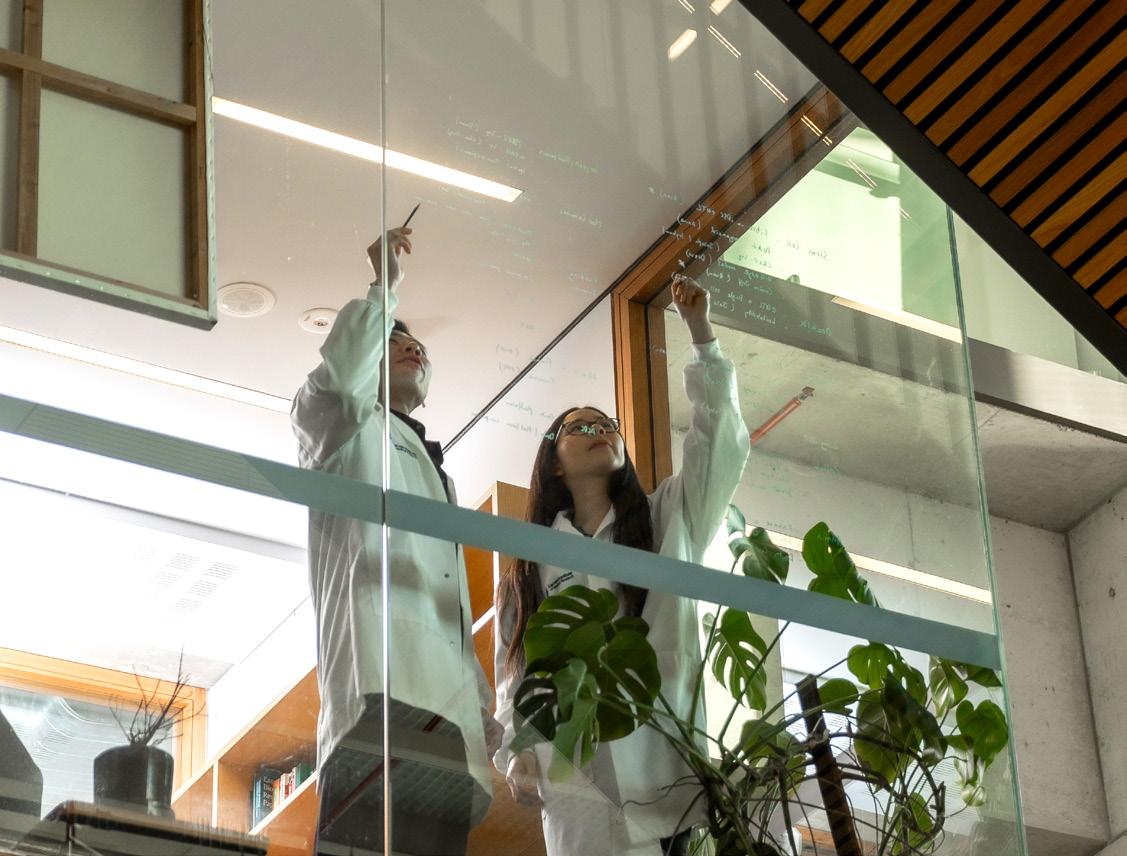
Mrs S Honer
Mrs Mary Hopkins
Ms Narelle Horobin
Mr Howard Houliston
Mrs Pamela Houliston
Mr Brian Howard
Mr Leslie E Howard
Mr Stewart Howarth
Mr Wayne Howson
Mrs Lynette A Hudson
Richard J Hudson
Mrs Lee Hunt
In Loving Memory of "Mate" Hutchen and Family
Mr Mircea A Iancu
R G & R J Imberger
Ms Susan Imer
Ms Edith Iseli
Lesley Isherwood
Ms Carol James
Ms Fiona James
Ms Rosemary Jasic
Mrs Kay Jaumees
Mrs Kerry Jefferies
Dr Tatiana Jelihovsky
Marie Jensen
Ms Grace Jerrett
Mrs Olivia Johnson
Ms Patricia Johnson
Mr Byram Johnston OAM and Mrs Deborah Johnston
Mrs Bernadette Johnston
Dr W G Grigor
Mr & Mrs Arthur and Elizabeth Jones
Mr Kevin Jones
Lloyd Gwyn Jones and Barbara Jones
Ms S Jones
Terry and Helen Jones
Ms Maryke Jonkman
Ms Gordana Josipovic
Isobel Kachoyan
Ms Daphne Kavassilas
Mrs Helen H Kayser
Mrs Beryl Keane
Mark Keeley
Maria Kelsall
Warwick & Carole Kendall
Mrs Isabel (Rae) Kennedy
Mr William Kennedy
Mr & Andrew & Kennett
Mrs Karenne L Kenny
In Loving Memory of John Kerkvliet
Miss Olivia Kesby
Ms Wendy Keys
Mrs Kate Khan
Mr Ashley & Mrs Gloria Kidd
Mr Bob R Kijurina
Mr Frank Killion
Ms Margaret King
Mr & Mrs Jeffry and Lyn Kirby
Mr W Bruce Kirkpatrick OAM and Mrs Juliet Kirkpatrick
Mrs Margaret Knight
Ms Lili Koch
Hendrika Kramer
Mr Samuel L Kushe
Ms Josie La Spina
Geoff and Carol Lack
Mr Christopher Ladd
Ms Julie Laforest
Mr Greg Lamont
Jean C Lang
Ms Gabriella Lang
Mrs Lynn Larri
Mr Barry Thompson and Ms Roberta Lauchlan
Mrs Cheryl Lavender
In Loving Memory of Ally Lawler
Mr Gregory Lawrence
Mary Lawson
Mr & Mrs Virginia & Kevin Leacy
Mrs Ella C Lee
Dr Steven Lee and Mrs Catherine Lee
Ms Wendy A Leeson
Mrs Beth Lehman
Miss Joy Leneaux-Gale
Mr & Mrs Cyril and Benita Levene
Mrs Amanda Leyten
Mrs Caroline Lill
Mrs Pamela Lincolne
Mrs Shirley Lindoy JP
Mr Ryszard Linkiewicz
Mr Jeffrey J Lipman
Mr Philip Lipscombe
Mrs Renata Litton
Mrs Jude Logan
Mrs Sheila Loudon
Mrs Nelis Loustrau
Susan Jane
Rosemary Lucas
Ms Rosemary Lucas-Moore
Mrs Barbara Lynch
Ms Anne L MacDonald
Mr David Macreadie
In Loving Memory of our Son Tim Maffey
Mrs Juliana Maher
Dr Harry Marget
Ms Sharon Markich
Ms Annette E Martin
Ms Gaye Martin
Mrs Kathy Martin
Donna Mae Mason
Mr Donald Matheson
Mr Lance Matheson
Mr David D McAdam
Ms Sharon McAuliffe
Dr John McCririck
Mrs Maree McCusker
In Loving Memory of Lola McDonagh
Ms Maree McDonnell
Ms Lynn McDonough
Ms Gai McDowell
Mr Peter J McFarland
Mr & Mrs Terry and Lynette McGarrigle
Mr Steven McGrath
Mrs Marguerite McKibbin
Ms Heather B McLaren
Ms Bridie McLennan
In Loving Memory of Kenneth McLeod
Mr John Robert McLure
Mr Raymond McMichael
Mr & Mrs Kent & Dianne McNab
In Loving Memory of Helen Parker
Miss Kathryn McQuarrie AM
Mr Martin John Meagher
Mr Geoffrey R Medcalf
Mrs Carol Ann Meiklejohn
Mrs Josephine Mentcherian
Jennifer Meredith-Brown
Ms Amanda Miles
Mr Richard Miller
Ms Rosie Miller
Mrs Catherine Mills
In Loving Memory of Robert Sharp
Ms Sharyn Minahan
Mr Glenn Mitchell
Ms Eva Mitro
Mr & Mrs Keith and Marguerite Mobbs
Mrs Mary Mockler
Ms Mary Molloy
Mr John Kelvin Moody
Mr & Mrs Philip & Margaret Moore
Mr Richard Moore
Mrs Diana and Mr Max Morison
Warren Morley
Mr Christopher Morralee
Mr Raymond Morris
Mr Ross C Mortensen
Mrs Jeannette Muggridge
Mr Jeff Munday
Mrs Pru Murphy
Mr Bruce Sinclair Murray
Mr Ian Murray
Mr Philip Murray
Mr Robert Muston
Ms Barbara Muzic
Ms Anna Nathan
Mr Peter Neave
Mr & Mrs Michael and Valda Neels
Ms Rosemary Neville
Mrs Frances Newman
Mrs Frances Newton
Mrs Margaret Neyle
Dr Elizabeth Niven
Mr Desmond Nolan
Mrs Ann Norman
Wayne and Gretina Norton
Mrs Wendy Norton
Mrs & Mr Novakovic
Dr Helen Nugent AC
Mr Charles Nuttall-Smith
Mr Simon Oaten
In Loving Memory of
Maureen Marea O'Connor
In Loving Memory of Finbarr O'Farrell
Mr & Mrs Chris & Janelle O'Grady
Mrs Joan O'Hara
Dr Elizabeth O'Hare
Mrs Margaret O'Leary
Mr W R O'Leary
Michael O’Neill
Mr Peter Olive
Miss Betty Olsen
Andrew O'Malley
Mr John G O'Neill
Lady Elizabeth Page
Ms Beverley Palmer
Miss Winnie Pang
Ms Jane Parker
Ms Judith Parker
Mr & Mrs Justin and Judith Parker
Mr Keith S Parker
Mr David Parkinson
Mr Cecil F Partington
Mr Chris Paspaley
Mr Rene Patat & Mr Geoffrey Priest
Nel Paterson
Mrs Joan Pearson
Ms Cynthia A Peck
Ms Marianne Pedersen
Ms Anne Pender
Mr James M Perham
Ms Larna Perry
Mrs Pauline Perry
Mrs Carol M Phillips
Mrs Almut Piatti
Mrs Margaret F Pierce
Dr Karla Plehwe
Mrs C A Pollini
Mr Alan Pollock
Lloyd and Joan Poulton
Mr William Powell
Mr & Mrs Edmund and Alviena Poznaks
Mr James and Mrs Wendy Preece
Mrs Margaret Preston
Mrs Tara Preston
Ms Andrea Pridgeon
Mrs Elizabeth Pryce
Ms Judy Radecki
Ms Margarita Rasink
Mr Mike Read
Ms Juliette Reay
Ms Janet Redbond
Mrs Jean Redman
Mrs Julie Reid
Mr Kevin Reilly
Dr Judith Reynolds
Mrs Julia Richardson
Mr Rudi H Ringger
Ms Annabel Ritchie
Ms Christine Roach
Mr Arthur Robbins
Miss Eunice Roberts
Merilyn Robertson
Mr Robert R Robinson
Ms Kathy Rockwell
Ms Jacqui Rodgers
Ms Barbara Rogers
Mr & Mrs Christopher and Nancye Rolfe
Mr Robert Rollins
Mr Bruce Rosenberg
Mrs Pat Roser
Mr David Ross
Dr Edna Ross
Ms Deirdre Royer
Mrs Wendy F Russell
Mrs Diana Rutter
Cheryl Ryan
Mrs Emma M Ryan
Mr George Saliba – Living with MS
Mrs Karen Samociuk
Mr Len Sanders
Mr Ken and Mrs Judy Sargeant
Mr Michael Sartori
Ms Bernadette Saunders
Ms Coral Saunders
Mrs Betty Saxby
Dr Lawrence K Sayer
Mrs Kristine Schmid
Dr John Schubert AO and Mrs Prue Schubert
Barry M Schulz AFC
Ms Karen Scott
Dr George W Seifert
Mrs Suzanne Selden
Mr Brian Selley – In Loving Memory of Gillian
Ms Yvonne Severn
In Memory of Mr Dennis Seward
Mrs Judith Shanahan
Leonard Graham Shaw
Mr Merv Shearman
JF Sheehan FCA
Mr Peter Shelley
Miss Thelma Shepherd
Ms Shona Sherwin
Mrs Edith Shipway
Mr David Short
Jane & Barry Simpson
Ms Marianne Simpson
Mrs J Sindel-Hand
Margaret Singer
Ms Molly A Slifka
Mrs Chris Smajstr
Mrs Mary Small
In Loving Memory of Cheryl Smith
Ms Claire Smith
Ms Lucia N Smith
Mrs Barbara Smithies
Ms Jody Somogy
In Loving Memory of Gianinno Soncin
Ms Betty Song
Ms Kate M South
Mrs Cynthia Southwell
Dr Peter Southwell-Keely
Spain Margaret
Ms Margaret H Spark
Ms Monica Sparnon
Ms Susan Spratt
Ms Maureen Stepanoff
Mr Rick Stevens
Ms Elizabeth Stone
Miss Winsome Strickland
Dr Jeanne-Claude Strong
Ann Stuckey
Mr & Mrs Peter and Diane Sturrock
Mr Robert Sturrock
Mr Frank Suen
In Memory of the Late Kathrin Nell A Wilshire
Ms Janice Sullivan
The JP & GM Sullivan Family
Ms Susan Sutherland
Ms Rachelle Szabason
Ms Leanne Tan
Mrs Lyn Tanner
Mr Neville Tanner
Mr Ralph Tapping
Ms Linda Taylor
Mr Craig Teece
Ms Irma Temple
Diana R Terp
Dawn Thomas
Ms Wendy Thompson
Fiona Tildesley
Mr Brad Timms
Mr G N Tindale
Ms Roslyn C Tinker
Ms Janet Tinkler
Mrs Carolyn Todd
Ross Tongue
Adelaide Mary Tonkin
Mr Greg Trigg
Mr Ross Tulloh
Ms Annika K Tults
Ms Jennifer Turner
Mrs Lynne D Tydeman
Mrs Maya Van Rol
Mrs Maureen A Vasquez
Mr & Mrs Ian and Sharon Vette
Ms Jill Vincent
Mr Frank Virgara
Mr Byron and Mrs Helen Vlahos
Mr & Mrs Neville and Stella Voges
Daphne Wagner
Ms Julie Wahlberg
Ms Verna Wakefield
Samantha Walder
Miss Sandra G Walker
Chris and Leigh Wallbank
Mr Alan & Mrs Karen Walsh
M T Walsh
Ms Rosalind Tedder Walters
Bee Ing Wan
Ms Mel War
Ms Shelley Warner
Ms Anna W M Warren
Ms Jackie Watson
Mr Len Waud
Mr Francis Wedesweiler
Ms Heather Weir
Mr Dennis Wellbelove
Geoff Weller
Mr Andrew Wells
Mr Howard Welsh
Gail West
Ms Lorraine West
Judith Wheeldon AM
Ms Nicole Wheeler
Mr William Wheeler
Ms Michele S White
Dr Yvonne White
Mrs Helen Whittle
Mr Robert Wickenden
Ms Joan Wilkinson
Miss Sonia Willemsen
Mr & Mrs Geoffrey & Gleness Williams
Mrs Janice (Helen) Williams
Mrs & Mr Yvonne & Francis Williams
Mrs Margaret Wilson
Mrs Heather Windshuttle
Ms Merri Winter
Mrs Barbara Withers-Payne
Ms Roberta Withnall
Mr & Mrs Karl and Madeline Wolf
Ms Katherine Wray-Barnes
Mr Colin R Wright
Mrs Dorothea Wright
Ms Janet Wright
Ms Pauline Wright
Ms Patricia Wynne
Mrs Elizabeth Yates
Mr Malcolm Yell
Mrs Vicki Young
Ms June M Yuen
Estates received
We were privileged to receive bequests from the estates of these farsighted, generous people in our community. We extend our heartfelt thanks to these supporters and condolences to their loved ones and friends. Their legacies will transform the health and lives of future generations.
Greg Adcock
Donald Anstey
John M Ball
Gilda Baracchi
Lynda W Bear
Barry Beck
Clare Beutum
Peter Binnie
Leslie Blackshaw
Leah Blair
Judith Bradley
Beryl Brown
Margaret Brown
Tom Casella
Veronica Christie
Loveday Cobcroft
Kathleen Cranstone
Kenneth Davies
John Ferguson
William Finighan
Mollie Fox
Alice France
Brett Garside
Beth Graham
Irene Gregory
Pamela Guy
Yahya Hamawi
Peter Harley
Herbert Hely
Jean Hill
Josie Hosie
John W Houston
Denis Klein
Paul Korgitta
Daniel-Francois Lemesle
Paul D Leslie
Sid Lewis
Leslie Logue
Thora Loudon
Annette Lunney
Doreen N Martin
Sheina Mccann
Shirely McInnes
Mabs Melville
Harold Muir
Francis I Murray
Caroline Needham
June Pick
Dolly Pockhanawalla
Joan E Poole
Gweneira Porter
Colleen Quinton
Marjorie Renshaw
Dolores Reseigh
Trevor Rice
Brian Rodan
John W Roe
Judith Rolfe
Julie Rundle
Elizabeth Scully
Miriam Segal
Angela Sofoulis
Maureen Stephenson
Paul Williams
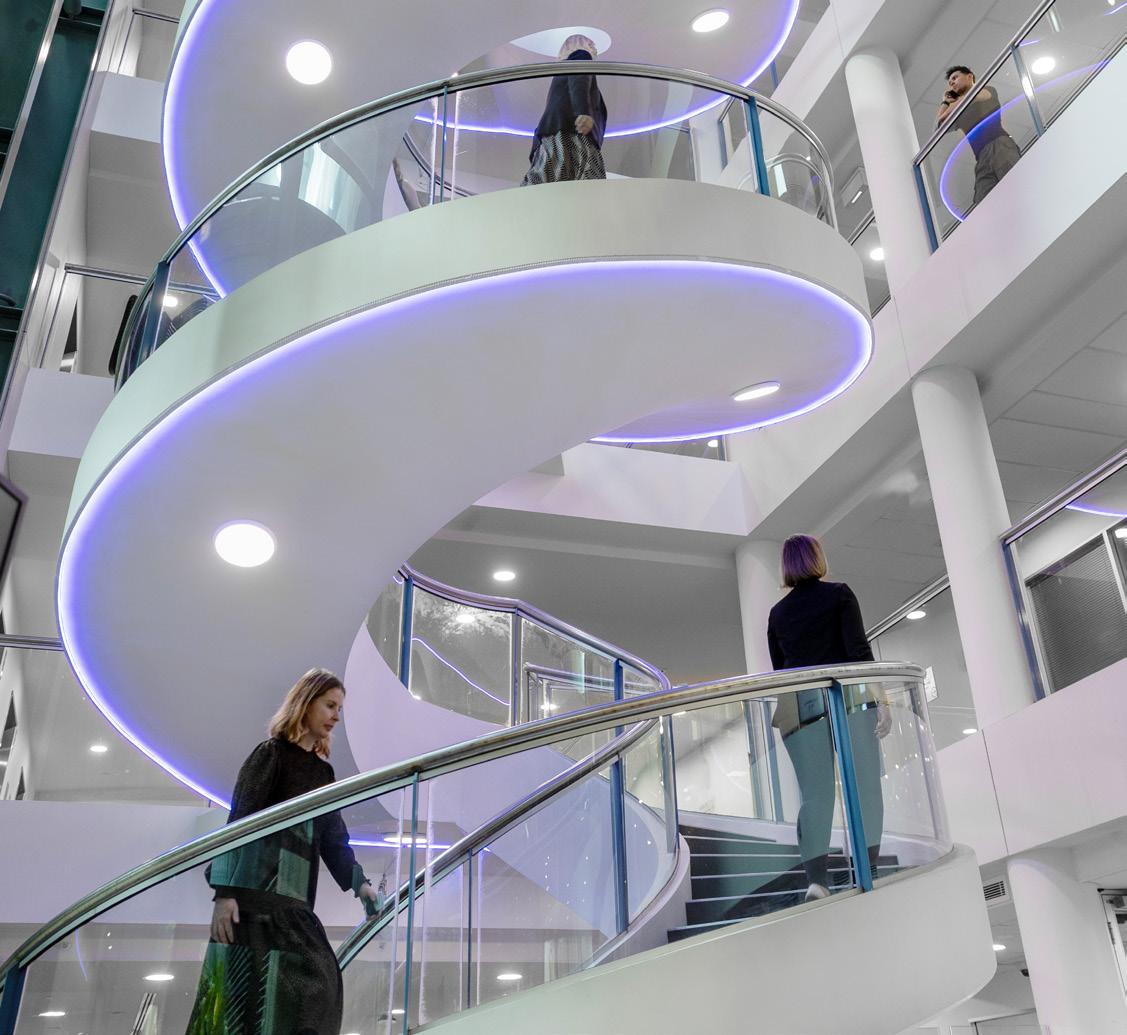

Garvan Institute of Medical Research
384 Victoria Street, Darlinghurst NSW, 2010 Australia
T + 61 2 9295 8100
garvan.org.au

Learn more
Stay up to date with the latest news, events and seminars. garvan.org.au/news-resources

Support us
Help us make discoveries that will improve health for all. garvan.org.au/ar-donate

